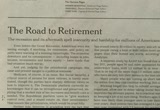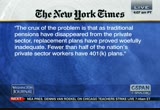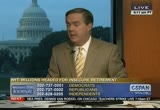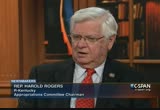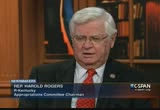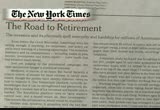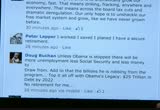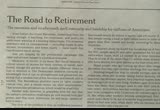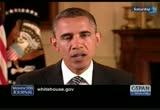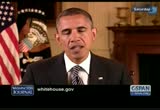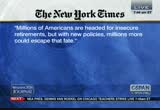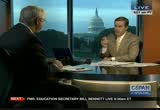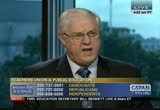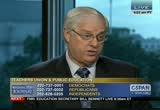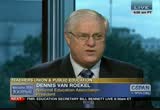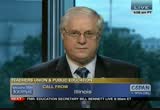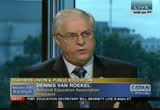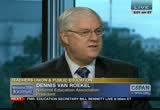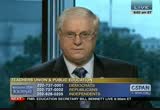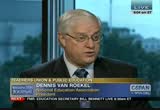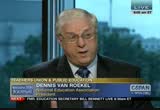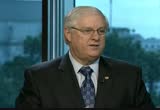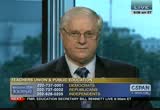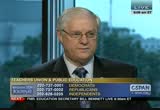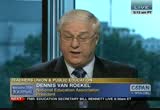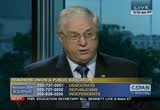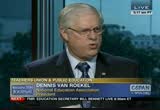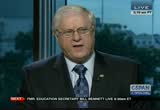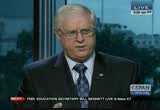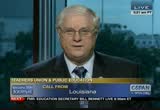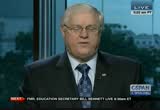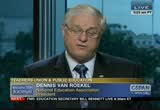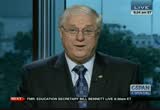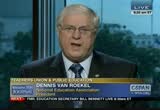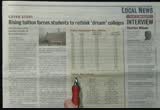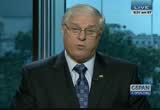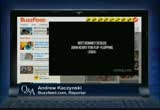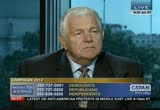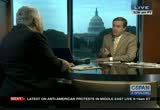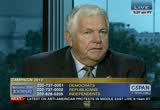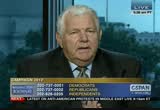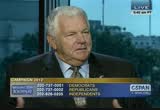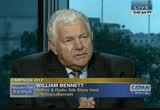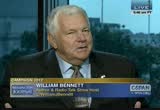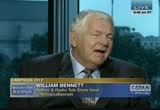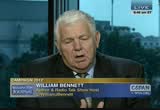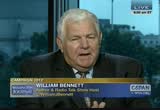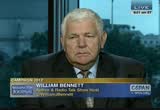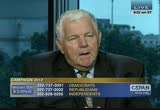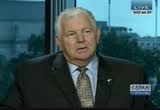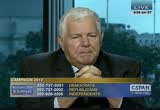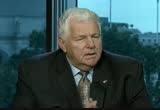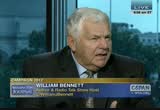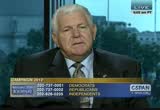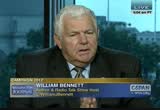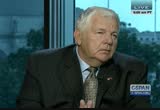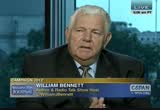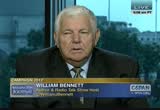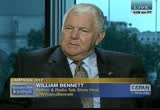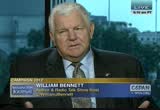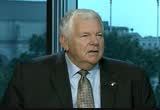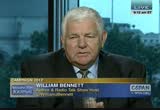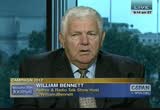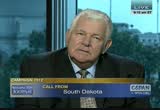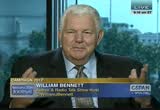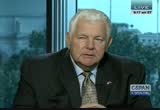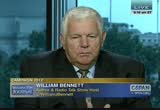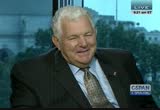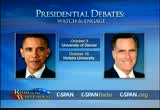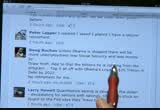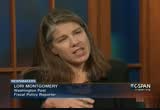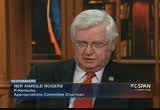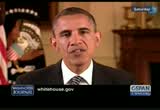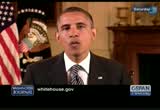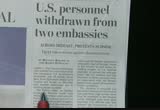tv Washington Journal CSPAN September 16, 2012 7:00am-10:00am EDT
7:00 am
association president over his reaction to the chicago teachers strike and a former education secretary discusses the 2012 presidential campaign and later, the latest on the anti- american protests in the middle east. "washington journal" is next. ♪ host: good morning and capitol hill. the flags remain at half staff today in honor of ambassador christopher stevens and three other americans killed last week in libya. here in washington the senate will be voting on a budget that keeps the government running for six months. it is called the continuing resolution and it will prevent any government shut down during this election season.
7:01 am
congress is off tomorrow and tuesday in observance of the jewish holiday. the president goes to ohio today and again on wednesday. we begin this morning with your comments on a "the new york times," editorial. are you ready for retirement? "the new york times" say that millions are headed for an in secure retirement and that focusing on this is one of the biggest issues in the campaign. the phone lines are open. for democrats, 202-737-0001. for republicans, 202-737-0002. for independents, 202-628-0205. other news this sunday morning, we begin with "the new york times" front page. "the u.s., preparing for the long era of unrest."
7:02 am
7:03 am
-- suzanne." we will be focusing more on this later in the program. the new share with you more of what is in the editorial page in "the new york times." as we all prepare for retirement, the editorial has this -- host: is a related story from the fox business channel, are your savings ready to retire?
7:04 am
"50% of americans have $25,000 in savings, total savings retirement, as well as other investments." we want to teach your calls on whether other americans are headed for an insecure retirement. fred is on the phone, independent line. good morning. caller: at this age you have to deal with something called the ryan budget. it wants to take medicare, social security, everything old people need to just live. they want to take a lot of this way.
7:05 am
and there is no way a retired person can make this money up. they want to give this money to the rich. for tax breaks. how anyone could retire under those strains that we are about to encounter, it is frightening. >> thank you for the call this morning. -- host: thank you for the call this morning. another aspect of the article, pointing out medicare and how many it covers, calling it an important campaign issue for both parties.
7:06 am
host: "the new york times" editorial this morning saying that millions of americans are headed for an in secure retirement. but come to the conversation this morning, gigi. -- welcome to the conversation this morning, gigi. caller: thank you. this frustrates me, i have been following a four years. why is no one talking about when we have a problem in the general budget to borrow money to lend us a tremendous amount or claims that we will put the money back? i wrote a letter to washington and told them that the retirement money was put up desperately and should never have been used in the general budget. i never got an answer. no one wants to talk about it.
7:07 am
therefore, it should be said. did they borrow it? i say that they stole it. no one wants to talk about it. i get very frustrated. i have the low income and had to work very hard for it. now i am retired and it is very hard. host: thank you for the call. joseph has a similar point of view, this from our twitter page -- host: back to the "the new york times" editorial.
7:08 am
host: are you ready for retirement? lawrenceville, ga., republican line, good morning. caller: the problem is the credit rating has dropped four times in the last year. we are now seventh in the world. our money has become worthless. so, when you retire you have to pay twice as much and you get twice as little. host: thank you for the call. you can also join the conversation on our facebook page, not send us a twitter or an e mail, e-mail address journal@c-span.org. next is a caller from napa valley, california. tim, independent line. caller: so, i just start talking?
7:09 am
host: jackie, good morning to you by an arlington, va., next. caller: thank you. ron paul needs to abolish the federal reserve or the united states treasury will take over printing money. then the investments would be safe. thank you. host: jeff, republican line, good morning. caller: good morning. as an individual, i have tried to save, realizing that social security was at risk and so forth. i have spoken to people in houston from argentina. frequently. my boss is from argentina. i have to say that if you are unaware of the debt of economic
7:10 am
collapse, you really need to find someone who has experienced it. if our credit rating does collapse and we have to pay realistic interest rates, we could not even make the interest on the debt with our taxes, currently. host: jeff, thank you for the call. with the overall debt now in excess of $16 trillion, "the new york times" phrase -- framed it in terms of saving enough. david on the twitter page has this point -- host: shock is on the phone from hawaii, up early on this sunday morning. caller: yes, they have not saved enough.
7:11 am
my social security is very minimal. i have been working for myself. host: how old are you? caller: 50. host: how much do you have? caller: i am lucky if i have $10,000. host: your advice to other baby boomers? caller: i will work until i cannot work anymore and then i will be at the mercy of whomever. [inaudible] host: thank you for the call. according to the story from fox business, only 42% have taken time to complete a retirement needs calculation that gives an overall look at what you will need when you will retire. if you have a 401k or other types of pension plan through your employer.
7:12 am
next, rocky, lincoln city, oregon. host: misinformation, seems like a lot people have it when they call in. not that i know all the information, but i would like to say that there are 10,000 people each month with social security, but a lot of people are battling away. they are already diseased and have been paying into social security before. they might pass away tomorrow. i do not know where that money goes. but, you know. i think there is plenty of money for social security. another thing is -- as far as people trying to educate themselves about this complicated situation with the government, they could maybe check out the filibusters that
7:13 am
have been going on for the past four years. host: thank you for the call. from "the new york times" -- " the road to retirement, hardship for many americans." they quoted the association for retired persons. host: jodi has this on the twitter page -- host: jeff, on the phone, hawaii. good morning. caller: i busted my ass to contribute and make the world around me a better place.
7:14 am
at 60 years old i find myself living with the tractable payments. people come to me for help. i am helping a lot of people get their heads on straight so that they can face what is coming up. i think it would be immoral to cut support for people like me. host: next is kim, good morning. caller: i would like to encourage people to do some reading on the subject. there is an interesting writer out there that has some great thoughts on this. i can tell you from personal experience that the best thing my wife and i ever did was to see this coming, to a degree. i am retired. we bought a home in upstate new york.
7:15 am
$65,000, the overhead is extremely low. and you have to feel for the people who are 30 years younger than us. unless the climate changes, they are truly doomed. they need to actually look at alternatives, different ways of thinking speak -- different ways of thinking. they will not get any help all from the republicans. they have to get the democrats to act seriously about preserving the benefits that people were to their entire lives for. host: one of our regular twitter sanders has this point -- host: four essential at preparations for retirement here -- jack rose points out --
7:16 am
first, live within your means. second, match your retirement plan from your foyer. third, pay off your debt. fourth, ongoing planning. you need to do ongoing plans to revisit your retirement program. our focus this morning, the " -- our focus this morning, "the new york times" editorial. mark, democratic line, philadelphia. caller: good morning. i have been retired for three years. one thing that i can tell you about retirement, all you're going to do is watch everything increase. my income has been reduced by $50 per month every year in a retired. in those three short years my net income has been reduced and
7:17 am
i only see things getting worse. i had my own business as a certified accountant. i was making $200 per hour and $300 per hour on the job search to maybe work part-time, but the best offer i have received is $25 per hour for per diem work. to the people out there who are thinking that once you retire you get a part-time job, think again, there are no jobs out here the pay anything. host: how old are you? caller: 62. host: thank you for following up with us. 41 k, "forced out, but not by design -- 401 k, "forced out, but not by design."
7:18 am
we will talk about the federal budget deficit coming up this morning. the leading issue facing congress after the election, sequestration and the fed, among its one of the hardest-hit areas. [video clip] >> are we reaching the limits of what is possible to give people confidence in government? can we go lower than we just did? >> i think that we just reached the bottom of domestic discretionary spending. to make the point further, just to remind you, only one-third of federal spending is what we appropriated. two-thirds is automatic spending, entitlements. when i first came to congress 32 years ago, it was the reverse. entitlements for one-third.
7:19 am
you appropriated 2/3. more than half of what we appropriate is for defense. we have cut $100 billion of domestic discretionary spending. we have cut $100 billion since i have been chairman. to put that in somewhat of a perspective, the normal domestic discretionary spending is around $480 million. that is a significant cut. we have cut spending for three years in a row, which has not happened since the wind down of world war ii. in the meantime, with the growth of the entitlement spending, we are seeing the debt go up the ceiling. $1.30 trillion just this year.
7:20 am
if we cut out all of the discretionary spending, all the money that we appropriate for defense and domestic, zeroing out all of that, we would still be in the red every year. we have done our job, the problem is with the automatic spending and cruise control. host: that was how rogers, ky, on our "newsmakers" program, following "washington journal" this morning at 10:00 a.m. eastern. "al qaeda calls for further attacks throughout the middle east." from "the chicago tribune," a local story that has gone
7:21 am
national, "teachers likely to put an end to a weeklong strike." "a price has been exacted as the fiscal outlook worsens." the "-- "the richmond times dispatch," focusing on the battle for prince william county. focusing on the politics in prince william county, virginia. back to your calls, we are focusing on the "the new york times" editorial entitled "the road to retirement." rosalie is on the phone. caller: good morning. thank you for your show. on this retirement, i was wondering, my husband died of
7:22 am
lung cancer at 47. i went back to school, got a good job, saved a lot of money. interest rates are dropping down to one-half of 1%. i used to earn between $1,000 and $2,000 for year. i have earned interest of only $138 on $300,000. and i help my children. as i dip into my principal, because i gave slow interest half of 1%, i cannot help my children as much.
7:23 am
we are all being affected. i am extremely angry at the interest rates being so low. it is helping the rich people, but what about older people who have saved all that money and now we are getting 120 something dollars out of it? host: for you personally and others in a similar situation, what do you think the solution is? caller: a quick solution should be some sort of help for older people who have taken minimum distribution out of their 401 k. something to help them with their interest rates. i do not know the answer, but i do know the for the people being killed on half of 1% of
7:24 am
7:25 am
7:26 am
host: the first of three presidential debates taking place next month of october 3. -- on october 3. we encourage you to watch and engaged on our debate hub, you can click and share video from all of the debates. new york, democratic line. the issue of retirement. good morning. caller: first wanted to say three things, first we needed to research. mitt romney is fighting for no regulation. there are times when the government has to come in for the regulation. i remember a time when people work for 30 years so that they could have a retirement plan. all of a sudden with bush it
7:27 am
disappeared. you can keep blaming obama for things that the republicans put in place. 30 years where you work and you work? when you retire after 30 years, you have no problems. what about this, collecting social security? what about all of those people? the mitt romney and pa ryan plan, they have no intention of thinking about people like you and me. host: thank you for the call. a look at what some of you might be reading. number one this week, "obama's america." host: next is fe, republican
7:28 am
line, florida. good morning. caller: all of this quantitative easing is what is wrong with our country. flooding it with dollars, i spent a lifetime saving, knowing that would have to take care of myself. my husband and i didn't -- deny ourselves many things when we were young. once our children were through school we were able to save a few dollars, but now those dollars are dwindling, they're not worth anything. they are only worth a fraction of what they were when i saved them. of course, they keep telling me that there is no inflation, but every time i go to the store -- $20 bills used to suffice, now i bring $50 bills every time. when they figure inflation out, they exclude gas prices and food
7:29 am
prices. what world are they living in? it is ridiculous. host: the call from "the new york times -- the call about the article i am "the new york times." "the president, widening his lead in the keystone state. host: tim, good morning, welcome to the conversation. caller: good morning, you are looking dapper as usual. listen, one thing i have noticed on a personal level, when george bush sr. was in office he had
7:30 am
the recession and there was this big raid on savings and loan. anyway, it is funny. i was laid up to the point where i had like $7,000 in a company- paid ira. what ever rollover, which you were allowed to put in, went into a personal account. i was laid off and he refused to extend any unemployment benefits. i had to go through all of that. fast-forward to the second george bush and we have all of those shenanigans with the major banks. i am going to make a prediction. all of these 401 k's that is a big scam. and you watch. i do not know what year the bulk of baby boomers will retire, but
7:31 am
mark my words, as sure as i am looking at 21 television, the year that the bulk of senior citizens reaching the top -- -- -- -- reach retirement age, that is when those will go in. there will be another collapse. all of these people with their 401 k thinking it would be their retirement? you watch and see. may i ask one thing about c- span? host: yes. caller: your 30 day rule, if you opened the phones and asked everyone from fascists to communists, i guarantee you that everyone would agree they you should make it 15 days and you would get a 99% consensus on that. host: thank you for that. you can also share your thoughts and comments on our facebook page.
7:32 am
host: beverly is on the phone, from chicago. caller: i am a public schoolteacher involved in this strike business. 30 years, ready to retire. in the state of illinois we have an option to either collect social security or the teacher'' pension. we cannot get both. i would like to perhaps suggest that the federal workers, including our illustrious
7:33 am
senators and congressional people, they have to contribute to social security as opposed to having a federal pension. maybe we can find out what they -- and who they like to call most of america. i may work as a teacher, but i anti-tax payer. they mishandled the postal workers' pension money. anytime there is surplus in anything, we are entitled to social security. i am not going to get into teachers' pension. i should not have to do that. host: do you think the strike will be resolved today? caller: i do not know. after the house of delegates' votes, the teachers have to
7:34 am
vote. i am not sure. i hope that they do. i am ready to go. host: thank you for the call. we will have a conversation with the head of the nea later in the program, as well as with bill bennett. this, from the twitter page -- host: the cover story that is out today, the president in cairo -- host: the president using his weekly address to talk about the middle east. [video clip] >> i have made it clear that the united states has a profound respect for people of all faith.
7:35 am
we stand for religious freedom and we reject the denigration of any religion, including islam. but there is never any justification for violence. there is no religion that condones the targeting of innocent men and women. no excuse for attacks on the embassies and convoys. the united states will never tolerate efforts to harm fellow americans. right now we're doing what we can to protect americans who are serving abroad, in contact with governments around the globe to underscore that every nation has a responsibility to help us protect our people. we have moved forward with an effort to see that justice has been done and we will not rest until our work is done. most of all, we must reaffirm that we will carry on the work of our fallen heroes. i know that the images on our televisions are disturbing, but never forget that for every angry mom -- every angry mob,
7:36 am
there are millions for yearning for the hope of freedom. the opportunity that drew so many to our shores and often the progress we have promoted across the group -- the globe. we are americans. we know our spirit cannot be broken and the foundation of our leadership cannot be shaken. that legacy will live on in the hearts of those who loved and the strength of those who serve the country. host: that was the president yesterday in his weekly address. and a look at the inside story of the ouster of the university of virginia president. teresa sullivan, forced out then reinstated. inside "the sunday magazine," a look at the man running for the
7:37 am
house seat in the barney frank district. that is from inside of "the new york times." talking about the issue of retirement and whether you are ready for it, "the new york times" says that millions are headed for an insecure retirement. caller: good morning. i resent the fact that social security is called an entitlement. when it is called an entitlement, it makes it seem as though you are getting something for free and really your getting at because of our good graces. people paying into social security, they have paid in for their whole working lives and were promised a certain amount
7:38 am
of retirement benefits from social security. the fact that the government has granted it since 1964, i believe, which is when lyndon johnson started its, every president has taken it out as though they were never set aside. they were put into general revenues and spent. it was never put aside, it is the equivalent of meat saving up for an ira and my boss saying the you do not need this right now, i will borrow the money and pay you back, but when he has borrowed all the money from the workers he says -- sorry, we use that money and had hard times, so you are not entitled to this, we have to cut it. i do not see the congressman cutting their pensions, which is a form of entitlement.
7:39 am
i see the government writing a separate amendment to send themselves. they can have whatever plan they want. but we, the people, pay for all of this. why don't they give up their social security? host: thank you for the call. another message from one of our viewers -- we have a serious problem with income distribution." a look at suicide bombers from "the new york times." pictures of children whose paths have crossed with suicide bombers. we mention this because the associated press this morning is again pointing out that at least one afghan police officer turned his gun on nato troops at a remote checkpoint just before dawn today, killing four american service members before
7:40 am
facing international officials. killing in total aid troops, featuring a string of insider attacks against international counterparts. "the working relationship has been key to the handover of security responsibilities to the afghan forces, as u.s. and other international troops continue to drop down." hampton, va., as we turn back to the issue of "the new york times" editorial. caller: yes, myself, i can see a
7:41 am
will be working until i am dead. there is no doubt about that. we have two generations, my grandfather and my father, a retired and that is about it. we will be working until we are dead. host: back to the editorial this morning -- ted, oregon, good morning. caller: i have been listening to the conversation. i agree with the lady in
7:42 am
connecticut. half of 1% by -- from a savings account is like being mugged in the street by a banker. i started working for plumbers in high school. i got out after seven years of active duty. i had to reenlist during the reagan depression. i got into the union plumbers in portland, oregon. i did my apprenticeship with a company called interstate mechanical. they went out of business about one year ago. i am 54. today i -- the day that i turned 55, i will pull the pin. i have called up the trust office of the local 290 and they tell me they are going to pay me 2500 something dollars per month. but this all goes by how much
7:43 am
time i have spent in the field. i have put down 1 million miles of pipe. have had some good employers and some crafty ones. i have seen some good business plans and some bad business plans, but it did not really make any difference to me because every hour that i worked, that benefit went to the local. i knew that the hours that i spent, the pipe i have thrown is going to pay me. my father, he was a union electrician. he was the one who explained to me that before labor unions came into play in the 1930's, if you wanted, if your employer wanted you to work every day for peanuts, you really had nothing to say about it. host: i am going to stop there.
7:44 am
thank you for calling and sharing your story with us. we appreciate it. a lot of people weighing in, including this from one of our viewers, who say that -- host: "the new york times" in the sunday review, looking at "don't show me the money." inside there are letters from people who are part of the encampment that took place in new york city. it has been one year since the occupy wall street movement began. you can get tt inside of "the new york times." more from the editorial this morning --
7:45 am
host: merrill, our last call from clearwater, florida. good morning. are you with us? caller: yes. host: please go ahead. caller: my point is, has there ever been anyone who has done an article or researched how much money has been borrowed from social security and never paid back one nickel? i paid into social security. my son's paid into social security. they said he is not going to get anything. i do not understand why, if i go to borrow money, i have to pay it back. why do they not have to pay back all the money that has been borrowed?
7:46 am
host: thank you for the call, merrill. let me just read to you the beginning of this editorial. we have been focusing for the last 40 minutes as to whether millions of americans are headed for secure retirement. host: thank you for your calls and comments on this issue. just under 55 days left in washington and iowa for voting. coming up, we will turn our attention to the issue of organized labor. bill bennett will be joining us. first, a look at the other
7:47 am
topics on the sunday morning programs, all of which can be heard on c-span radio. >> thank you, steve. today, the situation in the middle east is a focus of discussion with susan right, u.s. ambassador to the united nations. other topics today, the 2012 presidential election, the chicago teachers strike, and the weekend congress. you can hear second airings of all of the programs beginning and noon eastern. we begin with meet the press. david gregory welcomes benjamin netanyahu. then keith ellison, minn., and the chairman of the house homeland security committee, peter king. more from susan rice on "this week." 2:00, "fox news sunday." chris wallace welcomes mike
7:48 am
rogers, with another appearance by ambassador rice. "state of the union" follows a 3:00 p.m.. the guest is prime minister netanyahu and the house minority leader, nancy pelosi. at 4:00 p.m., "face the nation," where bob schieffer will talk with bob cain and ambassador rice. sunday network talk shows rearing on c-span radio, block -- brought to you as a public service -- at 1:00, "this week, 4:00, "face the nation." listen to them all on c-span radio, nationwide on xm satellite radio.
7:49 am
you can listen on your blackberry, android, iphone, or go online to c-span.org [. video clip] >> the emancipation proclamation, let's look at what it actually says. it does not free everybody. ok? just those states or parts of states still in rebellion. there are several parishes in the louisiana where slavery still exists because the union army did not have control. parts of virginia where the union army as a foothold and slavery still exists. >> president lincoln put together an early version of the emancipation proclamation. this weekend offers and historians take your questions
7:50 am
on the battle and repercussions of the single bloodiest day of fighting in american history. today, live from the antietam national battlefield and noon eastern, on c-span 3. >> "washington journal" continues. host: we are going to welcome dennis van roekel, thank you so much for being with us. guest: thank you. host: we want to talk about chicago school history and other school districts facing similar problems. these problems being faced in chicago are no different from boston, philadelphia, d.c.. what is going on here? guest: it is a complex problem and one of the things that hurts is the people that believe there is a similar -- silver bullet. it is more complex than that.
7:51 am
host: people critical of the unions say that they are the reason we are in this situation. how do you respond to that? guest: the status quo is just not acceptable in this country. cut the dropout rate does not fluctuate like the dow jones and we have to figure out what to do about that. the international assessment of student achievement, the united states often comes in at about average, but they do not mention that if you take all the schools in america with less than 1% poverty, we are number one in the world. it says we're doing a good job for some, but not all. we have got to figure that out. we have got to figure out what to do to overcome those obstacles to give the students an opportunity to succeed. host: you told npr just this
7:52 am
last week that unions are losing education reform in and certain areas. host: one of the things we have to change is the whole -- who is coming into the teaching profession? there is no system for recruitment for public education. no business of any size could survive with that kind of turnover. it costs too much to recruit, train, and hire people. no one should be allowed in a classroom with 30 or 40 students as a teacher of record is not fully trained, license, or certified. from day number one to the last day in the plot -- in the classroom, policy shouldn't dance practice with a good evaluations systems and feedback about what can be done differently to do better. we need good professional
7:53 am
development to make sure we are constantly growing. we cannot just keep saying no to other people's ideas. we have to knuckle down and say -- here is what we believe in our professional experience and knowledge. host: why is it so difficult to get rid of teachers who are not performing? guest: first of all, i think it is easy and is done all across this country. when it comes down to a teacher that should not be there, no one wants them there. we need to have a fair and efficient system. fair to the employer, the employee, efficient in time and cost. the most difficult task is making sure the right people are getting in the classroom. it makes it easy, no child
7:54 am
deserves to be experimented on. they should a person is competent before they get in. host: what about the finger is being put on the chicago teachers union in blame? guest: my first year in teaching i believe that if i cared enough and work hard enough i could deliver for every student, but it is not possible. there are so many decisions made outside the classroom that inside the impact my students, i have to have a voice. teaching every day all day long, who does that? it was my union. host: let's talk about some of the other style issues.
7:55 am
you have a high crime rate, a high poverty rate, a school lunch program -- how many of the students use the program for breakfast and lunch? how does that impact the teacher in the classroom with those situations? that is not even touch on the divorce rate. host: let me add one more thing to that, the number one reason for absence in elementary school is asthma. if diagnosed and treated, it is very manageable in most cases. when you named all of those factors, the answer is in the list of factors. it is not just the list of teachers or the school district. we have to go to the community
7:56 am
resources and say -- what are the obstacles that stand in the way of student success? together we have to figure out what we are willing to do to change the impact together. host: is the ratio at the top of the program? guest: it was part of the american recovery act. it was an influx of a lot of money. there were some things that we disagreed with. as we look at the new round, it is a little bit different. there is a great diversity in the race to the top and non-race to the top states. but it has to have signed off by the superintendent of the school board and the union, and if you do not have the collaboration, you cannot make any sustained change. we dislike the competitive nature, because too much impact
quote
7:57 am
the schools based on this crisis. is not just some that need relief. they all do. another focus of the next round is on early childhood education, which is where i think we need to focus our education. host: a long time math teacher in arizona public schools, our guest
7:58 am
needs. i left there and i now work in another district in the south suburbs. i think we are number one in the state for demographics. very high performing. we have so many resources and a lot of this teachers work nonstop. it is not
7:59 am
not understand that i saw. i remember bringing my students in one day and one student told me -- hey, there was this father, john father, maybe two blocks down, i look at that and it left an impression on me -- it was one of the many things i saw. host: thank you for the call. response? guest: he outlined it very clearly. there are areas we need to focus on in terms of combating the impact of poverty that have been held up around the world is number one. 20 years ago, they were not there. one of the major changes they made was 1990, when less than 40% of children were in early childhood.
8:00 am
it is a way of equalizing that opportunity before they come to school. i know of no family of need -- of means that denies the opportunity to try dance, music, all of these opportunities for young kids. why would we deny that to children whose parents did not have the resources to do that? that is the one area of investment in this country that will make the greatest difference. .
8:01 am
to cover these expenses the chicago public school system borrowed heavily and siphoned billions from the teachers' pension fund that, with the combination of the dot com bubble and recession have thrown it into a tailspin, now with a budget deficit of $1.2 billion. >> it's a big hill climb, isn't it? across the country this economic crisis has hurt a lot of programs and you mentioned one and those are pension systems. in managing the pension system to make them work, it's really, quote, simple, in terms of what you must do, difficult, in order to make the decisions. every year you have an actuarial report based on the benefits you're promising, based on the income coming into the plan, this tells you
8:02 am
how much we have to put into the plan every year. if you do that, it works. if you don't, it fails. it's happened in the private sector as well. united. their pension system collapsed because this didn't put in the resources required. what happened in the end was government takeover, pension benefit corporation had to take it over with pennies on the dollars. we have to manage those funds and manage them well because economic or retirement security is something that's important to all americans. it's sure in the debate with romney suggesting vouchers for medicare. people are understanding that retirement curity is important, not just for us as individuals, but for a nation. and as our baby boomers are moving into the retirement age, we must address that. host: next caller from myo, michigan, david on the phone with dennis roekel, head of the national education association, good morning. caller: good morning. i have much to add to this conversation. i believe. in raising my child, i was --
8:03 am
i assured myself that she was through the precalculus when she was through the eighth grade. i'm familiar with the catholic school system. then the next four years, i made sure that she was through the calculuses and knew the engineering nomenclature when i left high school. my father told me that in china and other parts of the world, children are educated at that level. here in america, a child goes through the eighth grade wallowing in arithmetic and they're lucky if they're through the precalculuses when they leave high school. then they have to spend their first two or three years in college, learning the calculuses and then being fluent with the engineering nomenclature. they're you're being taught by some asian or european student that's well ahead of them already.
8:04 am
host: david, as david talked about calculus and math, as a former math teacher yourself, what do you think? guest: we don't just teach arithmetic, gee a.m. tre and algebra are moved back but he makes an excellent point, we don't have the number of well trained math teachers we need and part of that is the system that underscores education. in countries like finland and singapore, when they recognize that, they do an analysis every 3-5 years and what they want to do is make public and private service comparable. not the same, comparable. so if you go into public service, it's not 1fourth of what you would have made. i could have thought mathematics, i chose that. wi need to deal with that. second thing, as a union we are leading in trying to change that. our new jersey
8:05 am
affiliate, the new jersey education association, formed a foundation called the center for teaching and learning, that organization has certified more physic, science and math teachers than all the universities in new jersey combined and we want to expand that to other states. the idea that we need qualified people to be teaching other kids -- our kids if we're going to close the gaps in mathematics around the world. host: what makes a teacher a good teacher. guest: bottom line is you have to know content but people assume if you know content you're a good teacher. i disagree with that wholeheartedly. i take it as a personal insult when someone assumes that anybody with a degree in math was to have -- all i needed to do to teach high school. i never failed to reach a person because i didn't know enough math. the hard part is creating the
8:06 am
environment, finding a way to help them understand when you have 35, 40 in a room but it's creating that environment where they can learn. you have to create in that learning space and understand why it's important to know what you're teaching. i always try to get my kids to tell me where they're going to be when they're 25 or 30 and use mathematics as the means of getting where you want to go. it's not an end in itself. getting an a in my precalculus class isn't enough. what i need to know is where you're going so i can show you what i tphaoefp math class and hear in english and all the other courses help you get to where you want to go. host: we're listening to mr. roekel, if you're just tuning in, our guest is dennis van roekel, president of the national education association. jan has a point, new research has found that nurturing early in life helps the social skills and many kids lack parents that care. guest: there is no research
8:07 am
that absolutely doesn't reinforce the power and potential in investing in early childhood education. it all says that. it's not a problem of not knowing what to do. it's the problem of not having the will to do it. we need to make that investment in our young people. will do far more than any other thing we cano to take on the obstacles of poverty that poverty provides. it's the wave of the future. host: suess -- suesson, boston, good morning. caller: thank you for taking my call. call the -- all the calls have been great. a couple of thoughts, although mr. van roekel kind of burst my bubble there, but i actually do believe that subject matter, expertise, and a true passion and accomplishment, demonstrated accomplishment in an area of study, be it liberal arts or math or science, is actually the paramount to have an inspired teacher, especially in the struggling school districts where children are
8:08 am
coming hungry, coming out of dysfunctional homes, parentless homes, homes where drugs and alcohol defines the family's possibilities and just their whole life situation. i just think that education pet gogy, if -- pedagogy if that's the word are great and learning techniques are great but if you want to get children, especially those in struggling school districts, get people that just are phenomenal in their subject area and also give them permission to use primary sources instead of dumb down, boreing -- boring, poorly written textbooks and the other thing i want to say is pay them more. i agree you get what you pay for in this world. i'm caring for an elderly parent and i pay these private care givers a lot more than the standard and in return i get phenomenal care and loyalty. the other thing i wanted to
8:09 am
y is my sister adopted a child who came out of the department of social services system here in massachusetts, and she achieved custody after that child had come through the second grade in the boston school system, sadly, not only because of life circumstances but her education was abysmal, she had never read a book, functional li illiterate, had no math skills, that child is an intensive, classic, religious private school and it is still an extreme struggle for the child, she's never really caught up but she's making gains and this is a very simplistic crick rum, very classic western canon based and the teachers aren't education majors, they are subject matter majors. host: i'll stop you there, thank you for your call and
8:10 am
sharing your thoughts with us i'll get a response. guest: susan, you have a lot of points. i agree, content is essential and i like what she said about the passion of the subject. i decided in seventh grade i was going to be a teacher and first decided to be a teacher, then i started thinking about which subject. well, i don't have that passion for poetry. poetry was difficult for me, but i loved mathematics, so for me, that was a natural choice. i think it is so important that we actually recruit people, because there are a lot of people with content knowledge and then we need to find the people who have the disposition, characterristics that make it work in a classroom. and that is a very important thing we do. the other thing i would mention as a union, we took on what we call a priority schools campaign. others call them underperforming schools. we thought they ought to be named priority. they were in about 17 states, 39, where we're trying to figure out what do you have to do to overcome that.
8:11 am
working in partnership, administration, school board and the union, reaching out to parents in the community, and we want to figure out the answer and spread that message far and wide. this next week i'll be visiting in evansville, illinois where working together they define the schools they believe need that intensive assistance, they developed an academy for principals, teachers and counselors who would work in that school saying what is it we need to know to address the needs of the children and now they're entering their third year. i'm really excited to be there and see the kinds of things they're figuring out that do make a difference in those difficult circumstances. host: one followup to susan's point from boston, if you are an educator and want to use this network in the classroom, go to c-span.org and click on c-span in the classroom. it's your chance to use what we talk about and write about each day. click on c-span in the
8:12 am
classroom. we turning other attention to public education, leta is on the phone from florida, our line for democrats, good morning. caller: >> are you with us? >> caller: yes. host: good morning, go ahead, please. caller: yes. well, i understand we're in education now, so i'll just say one thing on education. i have a daughter who's in the eighth grade, who just started the eighth grade this year, and she's very bright, she's very smart, and she loves school. but my daughter cannot add and subtract without a calculator. this is very upsetting to know she's in the eighth grade and cannot add and subtract. what happened to the cards, you know, the flip cards where you just learned simple adding and subtracting, multiplying and dividing? that went away with all the computers and everything.
8:13 am
that's not education and yes, we need to do everything mr. van roekel says but this has been said time and time again, we need, we need, we need. no. we need to pay our teachers a little bit more money, concentrate on that, do it, and make sure our teachers are paidel with. host: we'll get a response, thank you for the call. guest: you know, i thought long enough that i was there when we first started with calculators and computers, and back then, as i look back, we were debating the wrong question. people kept asked should students use calculators in the classroom and they would debate yes or no. i think the right question we should have addressed is when should they use calculators and when should they not use them. as you mentioned, simple number facts they need to know. my geometry class, if you have to use a calculator to tell me what 12 squared is,
8:14 am
we're in trouble. i need to know that. on the other hand, there are things where it would be simple not to use a calculator. it's when is appropriate, when is it not. there are certain times you should know it, certain theupls -- certain times it isn't. host: assistant editor of education joined us yesterday on c-span's "washington journal", we talked about the issue of teacher evaluation and merit pay for teachers. here's part of that conversation: >> [video clip] this is probably the most controversial thing happening in the field -- field right now, and teacher evaluations have been about things that are arguably not connected to teaching and learning, so the bulletin board looks nice, do you dress professionally, so the person in the obama administration, the stimulus
8:15 am
package, you mentioned race to the top, one of the initiatives that was funded through that in 2009, one of the polices there that was being pushed was overhauling teacher sraeual igses, and -- evaluations and one of the ideas was to use as one of several measures growth in student test scores. now, this is a complicated idea, it's not really been done before, there are legitimate i think research disagreements about whether these things can and should be used for teacher evaluation. but the idea of it is that you want to see not just -- teachers instructing kids and learning as a result of it. but typically what districts are doing such as the ones you named are coupling the sort of complex statisticual test score calculations with observations in classrooms done by either principals or assistant principals, sometimes by other expert
8:16 am
teachers. host: outlining the complexities, he picked up on two points. one is something we talked about earlier, teacher evaluation but also the testing of students and should that be a measure for the success or failure of a teacher. guest: he did an excellent job of define ago very complex problem. number one, teacher evaluation shouldn't be the evidence of student learning. the emphasis on math and reading have really disproportionately impacted the system. host: are we teaching students to test? guest: of course we are. when you label students, teachers, schools and school districts based on one test score that happens one day during the people, oh yeah, people do that, they narrow the curriculum, they change practice within the building. it's an unintended consequence that's very harmful. the overemphasis on testing has harmed. as a teacher, i made tests all the time. we're not opposed to tests. but what we do need is tests
8:17 am
that actually help us diagnose what we need to do more of, less of or differently to help a student succeed. it shouldn't be used as a high stakes label on teachers or students. and you know, the evidence of student learning, what about an art teacher, what about a science, history, civics teacher? the craziest example, in one school district where they had mandated -- mandated that 40, 50 percent was based on test scores, they said to teachers who didn't teach math or reading, choose the teachers whose test scores we use in your evaluation. that makes no sense. the other point about evaluation that i think is so important is what is the purpose of evaluation. the arizona statute said the purpose of teacher evaluation is for the improvement of instruction. if that's its purpose, the design system where somebody observed me for 20 minute as
8:18 am
year doesn't make sense. if the purpose of evaluation is to improve my practice, then it ought to be tied to good feed back, it ought to be continuous, there ought to be multiple majors, a way to enhance my practice and know whether or not what i'm doing impacts student learning. host: back to the calls, randy on the money from leastberg, virginia. republican line. caller: i'm from williamsberg, virginia, and my comment is i own a small business called virginia is for education. i built unique mobile fitness facilities because of the outcomes of virginia tech, when they built a mobile science lab, and the outcomes that they had had in southwestern virginia schools, in elevating scores in math and science, sadly, those divisions saw that trailer as a threat. i'm now feeling the same pressures from schools, where
8:19 am
i've made over 1100 school site visits and haven't taken one date for this school year yet. my problem is that for instance, we have a pet grant, a federal grant here in williams burg, $1.3 million to be spent over three years and to give you a for instance, the person run thank program is paying herself $120,000 for a 40 week work year. the problem is we have universities around here that are so called training teachers on behalf of its money and there's no measurement on the training, and when it comes to health and wellness for children and adults, americans, you train the client with people who have the skills and tools already. host: >> guest: the caller identifies i think something that we
8:20 am
really have to look at closely and that is this whole privatization of education. i think investors are looking, there's no more money to be made in the housing industry, there's not a lot left to make in the health care industry, so they're now turning to education. it's almost a billion dollars a year industry. and that motivation, their purpose is to make money. we have to be careful that what the purpose ought to be is providing the program that actually enhances student learning. and it can't be piecemeal where you have multiple providers do it in essence, trying to, through p.r., convince a district this is the program you ought to do. we're going to have to build that into the system. systemic change that actually provides the students what they need. especially as technology is changing so rapidly. i have great concerns of thi push for virtual schools. i can't imagine a student going through elementary school, sitting at home with a computer.
8:21 am
they miss all of the interaction with their peers, the whole collaboration, i just think it's the wrong motivation. i know there are better ways to do it but we need blended learning where you use a computer at home, as well as being in the classroom. we have things that we call it flipping the classroom where you learn or are exposed to content at home but in the classroom is where you have the discussion. so this whole area of privatization is one we need to look at, we need to look at the purpose and motivation behind it to what it ought to be is right for students, not what's right for the providers. host: this is from tom shipman who says the u.s. spends $506 billion in education, $718 billion on defense, that should be reversed. let's go to steve, shreveport, louisiana, good morning. caller: good morning steve and good morning, mr. van roekel. mr. van roekel, i got my
8:22 am
education, my high school diploma from overseas and honestly, i don't know if you all want to play games with this education over here, i don't know what it is. my daughter went to school over here, she was born over here and she went to a school and she became a lawyer. my daughter does not know how to multiply. i am so frustrated with education in this country. when i went to school back home, i was in third grade education, elementary school, i had to learn how to multiply from 1-100, and if i didn't learn it, i had to stay in the school until i learned it. the teacher -- the idea of the family, they can control the school and make a fuss about it, this and that, this is not going to work. host: your response. guest: one of the things that
8:23 am
i think will help us in this country do what you described, that we all define for all students, in all schools, in all localities what a student should know. the common core standards adopted by some 45 states is really an important step and i don't think people understand how powerful of an idea this was. first of all it was bipartisan, not from the federal government, it was from states, republican governors, democratic governors, and in the last five years, to do anything bipartisan is amazing. but what they did is they came up with a set of standards that all students should know. we're in the process of developing the second set of assessments, to measure the new standards and now we're absolutely in the middle of good implementation. will districts implement those standards in a good way. i think it will go a long ways to do what you described, that to clearly define grade by grade what students need to know and be able to do and to be able to measure that effectively in this second generation of
8:24 am
assessments. so i think we're going to have to step up. you make a very good point. we're not just competing here in this country. it's a worldwide global society now and we have to compete with all. host: julio on the phone from statin island, new york, good morning with dennis van roekel. caller: steve, i always get you when you're there, this is the third time. thank you very much and you're a good moderator. i want to ask mr. van roekel if you've read the book the dumbing down of america by margaret isobyte and i want to know if you recommend it and for parents as well. you said about poverty, debt is tied into poverty and american people may want to consider thaw don't want a federal reserve bank privately owned to spend money on your behalf, the government taxes you, then they don't want to tell you what they spent it on. if it's not spent on education and for us, why are we paying taxes when they're buying the banks overseas? guest: julio, i have not read
8:25 am
that book but i wrote it down. i'm always looking at new things to read, and so dumbing down of america, i will definitely look that up. and i liked your point at the end about we ought to be investing tax dollars in education. one economist explained it to me, i believe, in the simplest, most logical way i've heard anyone say. he said in our state systems in k-12, 1 of the major expenditures of tax dollars is in education, in k-12. he said therefore, if you want economic success, economic growth, and you've already invested in those people, you want to keep them in your state, and the way you keep them in the state is by creating well paying jobs, which further enhances economic development, because the higher their wages are, the more they pay in taxes. and he said that we're going in the opposite direction. we lose tax revenue by giving tax breaks to corporations who create minimum wage jobs
8:26 am
that pay less in taxes. so his road to success was very clear, invest in education, keep those in your state, create as many high paying jobs as you can, and the economic growth will follow, so i hope we in more and more states follow that magic formula. host: let me ask you to react to a story posted friday in the "washington post". i'm not sure if you saw it but it took place in wisconsin, a judge there basically striking down one of the laws put in place that would curb collective bargaining for public workers, sean sullivan writing a wisconsin judge on friday striking down the law signed by governor scott walker, republican from wisconsin, that did curb collective bargaining for most public employees, again, thrusting a contentious issue that spurred the recall elections in wisconsin back into the spotlight two months before the election, this, of course, also involving teachers. guest: absolutely. it's a very important issue and i think the purpose of collective bargaining, the idea that you have a balance of the voice, that
8:27 am
corporations can't go unfettered, that someone else, middle class workers, have a voice is really important, and although in wisconsin, the recall failed with governor walker. if we look at ohio, just next door, they passed a senate bill five which eliminated collective bargaining. that was put on the ballot as a referendum, ballot measure two, and that was turned -- that legislation was overturned by the vote of the people on a 3-1 margin. i think people understand that the middle class has to have a voice. there has to be a balance. and so as we move forward, i think it will continue to be part of not only the national campaign, but in campaigns for governors and state legislatures in this november, as well as in years ahead. host: before we take a call, i just want to get your reaction, this doesn't involve public education but colleges and this is a story, front page of the washington examiner, parents struggling as college tuitions explode and as you move inside the piece there, is this analysis
8:28 am
looking over the last 10-15 years about inflation, for example, in 2009, inflation was essentially nonexistent and yet, four-year private schools went up nearly 4 percent, public education went up 7 percent, and in 2011, when inflation was at 3.2%, tuition in private schools, up 4 1/2%, public schools, up 8.3%. is this sustainable? guest: it is not sustainable and the reason the tuition increases are way out of line is because public support for those universities has gone down. one university i read, they said in 1990, 25 percent of their budget was tuition, 75 percent came in state aid. today, it's absolutely reversed. 75 percent of their revenue, from tuition, only 25 percent from contributions from the state. that is not sustainable. the cost of college has gone out of sight and it's out of reach for most middle class families. it's good that we have loan programs, but it's also
8:29 am
harmful for a young student to graduate from college with debts of anywhere from 20- $60,000. in our student program in the national education association, we have about 70,000 college students who are members of nea who is planning to be teachers and when i talk to them and the levels of their debt when they graduate from college you just wonder how in the world do you go into a teaching job and succeed when you have that kind of debt hanging over your head. college affordability and access is a huge issue in the year ahead. host: one comparison, georgetown university, 12 years ago, just tuition, not room and board, was $25,000. it's now $43,000. and university of maryland, an in-state tuition was about $6300. it's now nearly $9000. at university of virginia, 12 years ago, it was just under $4500 a year, now it is in cess of $12,000 in state, much more for out of state at these public institutions, private institutions going up more than doubled in the last 10-12 years. >> so what we've done as a
8:30 am
society is taken the responsibility of providing education to our young people and shift thunderstorm to them and said if you want to be educated you need to pay for it. it is a formula for disaster. as we go into the 21st century, we need more people educated better than ever before in our history. this is not the time to be decreasing our investment education. it is a time to increase it. host: taking one more call, john on the phone from mckenicksberg, pennsylvania. on the republican line. caller: thank you for the call. this is interesting information. two real quick questions. number one, i was wondering if, since it's such a large union and it's always involved in politics and there are two sides to everything, my question number one real quick is when is the last time that huge teachers union worked with businesses, corporations, industries, to look for the kind of jobs of the future and to work with industry, not just the public unions and the taxing entities, the
8:31 am
school boards, when they tax to pay for all the school issues. when is the last time they worked with industry and business to find the jobs of the future? and the second question is charter schools. the competition now for public schools. we all know that's going to continue. and i would like to know what your guest thinks. are all the voters just -- all the teachers, are they just democrats or are some independents or republicans? it seems like they're heavily weighed to the democratic party, and do the independents and republicans, do they simply even matter anymore? host: i'll stop you there with about a minute of the left. two issues. we'll give you a minute to respond. guest: the last time i reached out to business was a month ago. i have a council advisory committee just to talk about those issues. secondly the national education association with over 3 million members, our membership is about one third republican, one third democrat and one third independent, so we reach out to candidates in all parties and what we care most about
8:32 am
is what are your positions on education. we support both republicans and democrats. there are more democrats that we are currently supporting, but it is because of their positions on education, not because of their party. host: we thank you very much for being with us, dennis van roekel, president of the national education association. guest: well, it was a great time, thank you very much for having me. host: by the way this morning in the "washington post", there is a look back at antetum, the battle that in many ways changed the war and often called the bloodiest battle of the civil war from 1862, this marking the 150th anniversary of that conflict. and the, of course, anniversary of the civil war overall. american history tv beginning at noon eastern time will be focusing on what happened in sharpsberg, maryland, you can get schedule information by logging on to our website, c-span.org or check it out, american history, every weekend on c-span three, 48 hours of history programming. it will be live today from the battleground in intitum,
8:33 am
we hope you tune in. coming up in a couple of minutes, former education secretary, radio talk show host bill bennett will join us as the "washington journal" continues on this sunday morning. >> i think people like to see how the views have shifted over the years, i think people like to see whether mitt romney, 1994, was comparing for welfare reform, abortion, they want to do the 2000 campaign, 200-7689 i -- 2007. i think people like to see how the politicians have evolved and there's sort of an element that's a gotcha element but there's also an element that people think this is incredibly interesting.
8:34 am
i've tried to think why it is that he has changed so often, why he finds it difficult to come down on one side of an issue. it sort of notes between both issues. runing it for state office, if your name is rod blagojevich -- >> rod is a hero of mine. >> i think the best way to describe it is an viral beating heart of the internet. >> more with buzz reporter andrew kazinski on c-span's q & a. >> "washington journal" continues. we want to k*b bill bennett, former education secretary. we want to talk to you about education and friday, the forum introducing your former employee, intern, now the vice president nominee of paul ryan. when did you first meet paul
8:35 am
ryan? guest: i met him at power america, hired by ben webber, former -- it was vin webber, jack kemp, and we were the partners of partner of america and paul ryan was hired as speech writer and staff assistant to jack kemp and also when i needed help. host: do you think he has helped the ticket? guest: yes i do. one thing that he has done that's quite remarkable is he has made the whole debate about medicare a fair debate and a debate which republicans can win. as you know he often says we can win this debate. i don't think anybody thought republicans would have a shot at this debate before paul ryan went in. it's also very interesting, steve, to see the kind of grades he's getting from older americans. and that is a surprise to the media. by paul is smart, he's very
8:36 am
persuasive. i think in the next two months he'll be even more of a percentage gain for republicans. host: you look at the latest polls, the president up 11 points in pennsylvania, and the nbc news maris poll has the president winning ohio, florida and virginia. if that happens there's no way mitt romney can win this election. guest: i think that's probably right and i think it's uphill for mitt romney. there's a lot to tap in the last few weeks and i think when it's digested and thought about, if it is thought about, romney still has a very good chance but it's definitely uphill. guest: in the weekly standard, bill crystal says if it' time to panic, it's time to panic about the prospect of four more years of barack obama as president and the weekly from theo message from the weekly standard is simple, explain how ghastly the prospect of four more years of president obama really is and explain the course after romney-ryan administration that will follow and how the new polices will lead to a national recovery. what he has been saying is mitt romney has not been
8:37 am
doing that. guest: well he's been doing it some. mitt romney is criticized -- remember when he put out the 59 points, they said this is too many points, too specific, now he's criticized for not being specific enough. maybe something in the middle like goldilocks and the porridge, not too hot, not too cold, maybe 10 points. he certainly needs to stay on offense. the debate is very important for him. one of the things in the past week has been the emergence of foreign policy as an issue. i think this is a strong place for mitt romney to go. i thought the statement that he made was proper and correct. host: in fact you read the entire statement on friday, why? guest: i did because i wanted the audience to know exactly what he said and see what their reaction was. it was obviously very positive. that's what he said when he said it was disgraceful, what the president did in response, to blame the filmmaker for what was happening all over -- well, not all over then, but in
8:38 am
several countries in the middle east and now all over. in, what, 20 countries now. and it strikes me as somewhat bizarre that people do not see how clearly this is a weakness for barack obama, that they have not articulated a defensible position on these issues. this was the president who went to cairo, ironically, to say there would be a new understanding and there's not a new understanding. in fact people think less of us than they used to during the bush administration. host let me ask you about your former boss ronald reagan, in april of 1980 when he was running for president, the failed mission that resulted in u.s. forces being killed as they were trying to capture the hostages being held in iran. and ronald reagan as a candidate issued a statement that said it's time for national unity, he waited six days before he then delivered a speech critical of the carter administration and his polices. in terms of the timing of the romney statement, should he have waited? guest: no, i don't think you have to wait when the
8:39 am
situation -- it's a very different situation than what ronald reagan was looking at. what he said was it was wrong to blame the wrong people and he was absolutely right about that. in terms of the particular negotiations that might take place, reagan backed off from that. but as you know, he took a very strong position on what the administration was doing. as events have unfolded, i think it's been clear that romney was right and this administration was not. and i think situations -- the situation is going to get worse over there, and one still waits for this administration to explain to us just exactly how some ridiculous little film like this inflames the entire world. it doesn't cohere, doesn't make sense. what i think is they sensed the united states withdrawing, being weak, the united states not reacting with strength, with the way it should, and i think that's a recipe for disaster in the future. host: dan balls in the "washington post" saying it's
8:40 am
time for romney to spell out his agenda. what does he need to do? guest: i think he could be more specific about what he wants to do. he said last week he had an economic plan, that would not decrease taxes on the wealthy, would not increase taxes on anyone, he could be more specific about that, i think. but i think the real case that he has to make is what happens if we have four more years, can we stand four more years of this. i think, my view is the country is being wrecked, that we are going downhill. maybe the most important statistic is not the economic stuff, which you hear endlessly about, unemployment and middle class family income and so on, but national morale, 57 percent of americans think we're in decline as a country and as a civilization. that's pathetic. this is what's happened to morale, our sense of shrefrbs. -- selves. if they want more they can elect barack obama.
8:41 am
host: loreen says it's time to shut down the republican party and this from the associated press, why aren't you winning, republican acti vies are incredulous, why can't republican mitt romney seem to break open a height race with the president given the nation's sluggish economy and enthusiasm to beat the democrats. guest: i don't blame mitt romney. he's not a great candidate, he's not a natural in the way that ronald reagan was a natural, in the way that bill clinton was a natural and in the way that barack obama was a natural. he's not that kind of political horseflash. he's a good candidate. i think he would be a very good president. but he's articulated a clear view about who he is and the differences with the president. i think we may want to put responsibility in a democracy on the american people, you know, and if the american people vote this guy back into office they will be punished and many will serve that punishment if this is what they decide to do. but it's really up to them, isn't it, and i know a lot of
8:42 am
people who look at the current situation and say well, he's doing pretty well. the heck he is. he's not doing well at all. i think people need to come to a recognition that this is their country, their future, their kids' future, do they want four more years of this, do they want to double down on this administration. host: you've heard the charge, you're not part of the media but many say in the mainstream media, in the tank for barack obama, there is a liberal agenda, a leftist agenda favoring the president in this campaign. guest: there isn't any question about it. there hasn't been a question about it for a long time. one piece of evidence is the surveys of the media, not of the mainstream media, where they were asked who they voted for and if you hear conversations and go to cocktail parties and events around washington you can tell where people are. i know i often hear from people who know i was the secretary of education, know i write books and they say you're a thoughtful person or at least a sometimes thoughtful person, you're not like one of the tea party people or the conservative,
8:43 am
right wing people and i say no, i am one of those conservative people. so you can read the bias pretty clearly. this is the way journalism schools work, this is the way the reward system works. it's very similar to what goes on in higher education. you bring into the fold people who are of your view and promote them that way. host: the news of the day from "the washington post" and striking chicago teachers holding a rally t. appears as if this will be settled today, a vote scheduled later in the day and if that happens teachers could be back on the job tomorrow. the last strike was in 1987, the education secretary at the time -- >> guest: it was i. i would -- if i said it was me that would be a problem. it was i, secretary of education. i had called the chicago public schools the worst schools in the country, a spokesman from the mayor's office at the time stood you said and said we're not the worst schools in the country, detroit is the worst schools in the country, i said good for you, don't be guilty of low aspirations.
8:44 am
i must say chicago has made progress, it's probably now the fourth worst school district in the country. i say this a big ironically. host: what are the problems? spell out the problems for the city. guest: the main problem, of course, is the condition of kids in inner cities in america. and i don't blame teachers for that. that is they are getting a lot of kids who do not have parental interest, parental involvement, a lot of kids from single parent homes. look, the singlemost important fact for the american future is 40 percent of our kids are born out of wedlock. this makes a difference in life, this makes a difference in society. so a lot of the kids that the teachers and schools have to work with come to them less than ready for school, and what can they count on after school? some kids find, other kids know, it's not so good. so understand that the material they're getting isn't all potential rhodes scholars, we understand that. nevertheless we expect our teachers to do their best and
8:45 am
do better than they're doing and here's the remarkable thing. there are schools that take such children rand do very well by them, teach them, improve them, they learn to read and write and count and think. the educational research now is clear, and i think this is the heart of the matter, steve, it's been done by the milken family foundation, los angeles and in other places, if you take a child in the third grade at the middle level in the 50th percentile, math and reading, and give him an excellent teacher, in two years that child will be at the 80th percentile, if you give that child a poor teacher, that child in two years will be at the 20th percentile. what more do we need to know? but that good teachers make a huge difference in the life of a child. not all the difference. not everything. most important person in the child's life is a parent, obviously. but if you can move from the 50th to the 80th with a great teacher or 50 to 20 with a poor teacher you've got to
8:46 am
pay taeupbgs to the quality of the teaching force. the true evaluation isn't just about improving teachers. it's also about identifying who are the ones who should be promoted, rewarded, given more opportunity, given more responsibility, and encouraging out 69 profession people who are -- out of the profession people who are harming kids. host: how do you do that fairly? guest: you do it fairly through a number of monies and people with be -- can be open minded about this. i visited about 150 schools when i was secretary and i've now visited probably more than 600 schools. there is not a single school that i have been in, where if you go into the teacher room, faculty room and say to the teachers who's the best teacher here, who's the really great teacher in english or math or the -- where the teachers turn and say we have no idea, there's no way to tell. there's no way to evaluate it. it's ridiculous. it's like going into a hospital or a newsroom or a football team, any place
8:47 am
else, everybody knows who the great teachers are but we get into this notion that it's impossible to figure out. one of the beats in chicago is they're using standardized tests as part of the measurement for evaluating teachers. you should use standardized tests as part of the evaluation. you should also use other things like the assessment of other teachers. see if you said to teachers it seems to me as a group there, are big raises in this, there are big opportunities in this for all of you if you will clean up your own house, clean up your own act, discipline the people or encourage out of the profession people who don't belong in it and encourage rewards for the people who are excellent, i think what we -- we could do that, a rational system would do that, it would take into account what kids are scoring, what parents think and what other teachers think. host: politics and education with our guest bill bennett, former education secretary, radio talk show host and author of how many books? guest: 22.
8:48 am
host: jane is on the phone from cleveland, ohio. caller: mr. bennett, they tell us that social security and medicare are in trouble. i just wonder what you think if teachers and firefighters and policemen were -- would pay into it, they say they want a dollar of increase for every $10 of cuts. well, before they start cutting social security, don't you think everybody should pay into it? a lot of americans don't have the benefits and the pensions that these teachers and all the public employees have. all we're going to get is social security. i think it would be best to help the system if everybody paid into it. what do you think? guest: well it certainly would bring more funds in. i lot -- a lot of people don't realize it, the caller is right to bring it up, and a lot of people don't realize in a lot of the cities and states, teachers do not pay in social security at all, they have their own retirement plan. in chicago, they don't. they have their observe retirement -- own retirement plan, health plan.
8:49 am
they make on average in chicago -- last numbers i saw were $75,000 a year for about 170 days' work or, what is that, 30 -- figure it out, let's see, five, 30, five, 36 weeks, something like that, work -- weeks of work in the education system. they have $75,000, a very good retirement, very good health care benefits. by the way, there's a myth, a kennard, that people do not want to go into teaching. that is wrong. there are a lot of people who want to go into teaching. do you know that something like 16 percent of the harvard graduates in the last two years have applied for something called teach for america, which is this wonderful program which encourages graduates in liberal -- libbal arts for teach, 80 percent at princeton, 20 percent at university of north carolina, they want to go into teaching. the notion that we better do
8:50 am
something because people don't want to go in is wrong. make the conditions better, encourage excellence, reward good teaching and you will have more people going in but yeah i see the caller's point. host: dennis van roekel said in the first five years, 42 percent of public school teachers leave the classroom. guest: well, that's right. it's interesting, in the teach for america program, which is just one track where you get the liberal arts majors, i think a higher percentage stay, i'm pretty sure of those numbers, but people go in and they find it to be a pretty discouraging environment. they may find it discouraging for a lot of reasons. one of the reasons that people i know have left teaching is that there are better opportunities elsewhere for promotion if you are doing a good job. good excellence is recognized and rewarded. it still is not. look, you had the situation in d.c., and let me just say, washington, d.c. scores are lower than chicago's, so we're not bragging here, about this city, where it was possible for teachers to make
8:51 am
i think 110, $120,000 a year, but they had to accept a pretty rigorous system of evaluation, and they wouldn't do it, they voted it down. that's why the former chancellor, michelle rhee, left washington. host: paul, joining us from new york city with bill bennett, good morning. caller: can you hear me? host: sure can. caller: i want to say first of all i agree with mr. bennett on education, i think it's great he mentions the length of time teachers are actually working, but i want to ask him a question, basically two questions. one is why does america spend more on education than any other economically developed country, at least of the vast -- at least the vast majority and get less, and why do we spend so much on health care as a percentage of gdp and everything else and get so much less. guest: i don't think we get less for health care. it's the best health care in
8:52 am
the world. now it may not be. the obama care system may wreck or system. the burdens imposed on doctors and hospitals i think will be too great. the thrust of the question is about education. we spend a lot of money because we spend a lot of money on a lot of things. i was talking to the assistant, mr. van roekel, head of the national education system, outside as we were listening, and it's very interesting that the whole thrust of the education debate now is how teachers need more, how the schools need more. we have been giving more money to the schools. not the last two years, because of what's happening in the economy. but consistently, if you look at the curve, you will see education spending up, up, up, performance is flat. we have given more, spent more, spent more and gotten a flat result, no improvement in our system, because it doesn't have accountability. it does not have accountability. >> -- host: should there be a
8:53 am
department of education? guest: there will be for the foreseeable future. you remember i was held hostage for a while, a liberal told ronald reagan he would not confirm me as secretary of education unless ronald reagan sent him a letter saying he wouldn't abolish the department and i told the president, you do what you want, you're the president and i can do something else if you abolish the department. he didn't have the votes then, ronald reagan, in his second term. if he didn't have them then, you won't need them now. you don't need a department of education, you need some federal responsibility in education but it could be minimal. when i was secretary, we did a poll, a survey, of all our grant recipients and we asked them to evaluate the program, the program that got the best grades, the bloc grant to the states. we take the money, we take our cut out, and send it back to them. that's the program they felt was the best. people said why did you take it in the first place, why
8:54 am
don't you leave it there. host: from virginia, good morning. caller: good morning. i'm just sitting here amazed and outraged by the assertions that the former secretary is making. number one, blaming the obama administration for the mess in the middle east, because of obama's polices, as i recall a year ago, condoleezza rice and the other members of the bush administration were tripping over one another to claim that they were the ones responsible for the arab uprising, that they were the ones that planted the seed of democracy by starting these wars in iraq that cost is much in terms of life and money, and this other assertion that the obama health care plan is going to ruin our system, national geographic magazine two years ago had a comparison of the costs spent her capita by various european nations and
8:55 am
little portugal, spending about $2500 per person, per year on health care had better outcomes in infant mortality than the united states, which is paying three times more. guest: i don't believe it. when you see the flow happen in the different direction, then i'll believe it. what do i mean by that. when we see more americans going to europe for health care rather than europeans coming here for health care, then i will buy the european system or at least part of that argument. look, in terms of the so called arab spring, the president, again, when he went to cairo said he hoped based on mutual respect we would have better relations. we do not have much better relations. you can say what you want about the bush administration or condoleezza rice and so on. i agreed with the war in iraq, i think it was the right thing to do. i'm worried we're going to lose ground there. but barack obama has certainly improved peoples' view of the united states or relations with countries
8:56 am
there in the middle east. the situation in iran is very tense. i happen to think the israelis probably will strike iran, and i think they may do it before the election. i don't have any inside information here, but that's just my guess. but the notion that you can do -- put forward an olive leaf and it would be reciprocated by people there is not the case. we wondered what would happen in egypt, we now have the muslim brotherhood. why aren't people outraged that a flag of the united states was taken down, an al-qaeda flag was put up in its place, that everywhere -- not ef where, but in 20 countries, people want to kill americans, that our ambassador was killed, slaughtered, a symbol of the united states, and we are caught -- when we are asked about it our response is well, thisbosiso in california shouldn't have made the movie. that is just insufficient for the world's greatest superpower. the response was
8:57 am
insufficient, and weak. i disagree with the caller. host: the "new york post", again, reprinting what you said friday, i think it's a terrible course for america to stand in apology of our values, next on that, 60 minutes, the president being inter rude on that cbs program, governor romney seems to have a tendency to shoot first and aim later. guest: one expects the president to shoot back at mitt romney but i think that romney is exposed to -- has expose add real weakness here. i th were under an illusion that the world would accept them as the new savior, that everyone would step aside, and that these radical people who hate us, hate everything we stand for, would somehow turn their swords into plow shares. they have not done that and that is clear as we turn on the tv. what are we asking, are we asking our ambassadors, close down our consulates and embassies in sudan and
8:58 am
tunisia? this is not a good sign. this is not a new signal. hoen hoen john has what contribution did you make as education secretary? guest: people tell me that we raised the bar in terms of discussions of higher education, what standards should be, which is something i was trying to do of the i was not of the view that the secretary of education ought to transform the system. that's not his job. the secretary of education's job i think was mostly bully pulpit to raise the issues that needed to be addressed. we talked about three at the time, content, choice, and character. that was in the mid '80s. i'm still very proud of those because now we are having a big discussion about content, actually an agreement about content, the core standards that are being talked about all over the country. choice remains critical i think in education. that's one way you can get
8:59 am
accountability is giving parents choice. we have arguably the best system of higher education but enormously wasteful and enormously expensive and you have the reason -- the reason for quality is the choice in that system and character, and there's a new book out by a man named paul tuft which talks about the importance of character and the virtues, if you will, in succeeding in education, so i'm very pleased with that. that was the legacy i wanted to leave and i'm pleased to have done so. host: let me go back to an issue we talked about in the last hour, parents struggling as college costs explode and what the examiner did, bill bennett, is took a look at the inflation rate over the last 10-12 years, back in 2009, inflation was essentially nonexistent, yet four year private colleges that year went up nearly 4 percent, 7 percent at public institutions and last year, private schools going up 4 1/2%. you can see the significant increase over the last 12 years, and private schools, up 8.3%.
9:00 am
there's also this cover story, which is last week's newsweek magazine, is college a lousy investment. guest: i know. i'm writing a book about this, is college worth it, and it will be out in the spring. it's amazing. you know, one of the thing i'm reminded of is how old i am and how you're virtually ageless! but that they quote the -- when they write the chicago public schools article, they quote me from 1986 or '87, now i'm quoted in higher education for something i said in 1988, bennett, 2. o, if you provide more student aid from the federal government to colleges and universities, they will raise tuition. if you put more money into the system to help students, the colleges and universities will raise tuition. and so the student will not get any closer. this is exactly what they did. the president of the -- >> host: let me just show you this out of newsweek magazine, these are students with their debt, 75, $25,000,
9:01 am
$100,000 plus. guest: i wrote about a girl from ohio northern who majored in sociology or something, and she graduated, she owed $100,000, she's waitressing, no job available, she's putting off getting married, certainly putting off having kids because of the student debt. for a lot of people it doesn't make sense to go to college. it depends. depends on where you go, what you study, what the job market is like, and the lot. however, americans believe that this is a sacred and wonderful thing and i understand parents who want more than anything to send their kids to college, will put any number of members of the family to work to go, borrow whatever it is, the colleges that remain, however, i think venal in this regard. they want all the money they can possibly get and they get it. there are very few institutions that are responsible about this. growth city is one that doesn't take federal aid and they're very conscientious, it's a very reasonable tuition there, too, but the
9:02 am
day of reckoning i think may be coming for colleges and universities because the price and the results are now coming home to people. how much they owe and what are they getting. host: dennis is on the phone from florida with bill bennett, good morning. caller: good morning mr. secretary. depending upon how good your memory is, you may know me as dennis from miami calling into the -- into the radio show. guest: of course. caller: that was a great story. this is from one catholic to another. with so much at stake, in the upcoming election in november, for the catholic church, the institutional church, and the members in it, does it seem to be that the catholic church, the clergy, are doing shockingly little in the way of teaching to the issues? guest: yes. host: -- caller: and number two when you keep in mind as a catholic -- catholic from obama is proabortion, can a catholic actually vote for
9:03 am
obama and still actually be a catholic? guest: that's a -- i'll leave that to rome. let's put it this way. my parish is the same as chris matthews was, teddy kennedy and mark shields, so that would suggest to people either that the catholic church has been identity crisis or one ofis is in heresy on this. -- one of us is in heresy on this. but yes, you raise very serious issues and this whole issue of omabacare, the whole context here of contraception and sandra fluke and all that raises a very serious question about church-state relations and the independence of the churches under the first amendment. look, let me be connected -- connect the two strands of the conversation together. i think the reason that the philosophy of barack bin laden and the person of barack obama -- barack obama and the person of barack obama has to do ultimately with our educational system. i think that what republicans believe about individual
9:04 am
responsibility, self reliance, that this is the last best hope of earth, is not as broadly believed as it used to be. there was a survey done not long ago, asking what system was superior, socialism or capitalism, i think capitalism edged out socialism by about three points. why would americans believe that? because they're not taught otherwise. this is what we're supposed to learn in the schools. plato said the two most important questions are who gets to teach the children and what do they teach them. you are now seeing, you know, in adulthood, several generations of people raised in our schools to think that america is largely a suspect country, it's an exploiter, an imperialist place, it's really unbalanced, not a great place, and this is not true. we have our sins, we have our problems, we have our shortcomings, but in the long story of humanity and history, the history of the american achievement is high
9:05 am
and unique. a lot of americans don't know that and as a result, they're not appalled by things that they see our president saying and notions that you know, america is in de cline. they say -- decline. they think well, a lot of countries are in decline and the president says we think of ourselves as exceptional, as do other countries. there's a way in which he doesn't appreciate the uniqueness of america and the american story in american history. the one way in which he does was the best thing he ever said and that was the night he was -- he won the election, where he said this could not have happened in any other country. he's right about that. he needs to broaden his appreciation and deepen it a little more. host our conversation with bill bill bennett if you're joining us on radio, check out bill bennett.com, twitter handle is at william j. bennett and among the books, the book of virtues, the children's book of virtues, the book of man, readings on the path to moonhood and working on the 23rd book.
9:06 am
guest: i guess i am. host: when is it coming out. guest: when do i get tenure, huh? it will be out in the spring, probably may. host: thank you for waiting. caller: yes, i was just amazed with mr. bennett and his lovely remarks about our president. this lovely catholic man who still loves this church, who raped and molested many children in this country and we want to have our country run by their catholic rules. well, not everybody in this country is catholic. and this country was started on the reason for people to have the choice of their own religion. not so states could choose certain religions to make our laws by. guest: well, the caller is right about the abuses in the church. they were horrible. i am a member of of -- an old friend of mine, cardinal in
9:07 am
boston, asking him to step down. it had to be done, we had to kpor sighs what was -- exorcise, and nobody is suggesting that the pope should be run out of rome and i think we settled that with the election of john kennedy and i agree with the caller, the state government should not be interfering with the religious liberties and setting tests for what constitutes appropriate behavior for religious institutions. host: our next call tprer peoria, illinois, valdez is on the phone, good morning. caller: hi good morning. i think i should generalize my comments because there are too many that he's make thank are inaccurate. mr. bennett is too smart with a phd to be spewing teachers do this and that. i'm a retired police officer, my brother is a retired teacher. we don't pay into social security and we don't get social security. guest: right. caller: so you know that. secondly, you must be conflicted with the kinds of
9:08 am
things you say about wars, not ever having served, i was i was active duty, three years army, and it's just unfortunate that it's easy for pay -- to pay what teachers should do, what we should all do what we have a congress that has a 10 percent thereabouts approval rating, nothing gets done, but yet we want to step on teachers and make it sound as if they have all the responsibility to make sure our kids grow up. guest guest i didn't say that and i don't believe it. when we started talking about chicago i started by saying why would -- a lot of the kids who come are ready. nevertheless, they're your kids and students and you have to do your best by them. the suggest is the chicago schools and the teachers strike. i'm not beating up on teachers though i would encourage poor teachers to get out of the business because the evidence is also clear from the research just how much harm poor teachers do. again that study i cited available from the milliken
9:09 am
foundation, the 50th per sen percentile, gets -- percentile, at the 80th with a good teacher, a poor teacher, down to the 20th. that's all we need to know. host inner city schools, you talk about the poverty rate, crime rate, number of single parent households. these aren't -- these are societal issues. how do we as a society deal with that. guest: there's a movie called "waiting for superman", a very interesting movie, about parents wanting to get their kids into better schools. turns out a number of people, actually a large number of people in the inner city, want to do better by their children. they're not sure quite how to do it but they go to lotteries, do whatever they can, they falsify addresses in order to say they live in a certain place so their child can go to a better school. we have in d.c. or used to have the d.c. opportunity scholarship program, which is a great program where kids can go to school. one of the remarkable things, i was in debate with chris
9:10 am
matthews in texas, we disagreed i think on everything, except, you know, the trinity. but he said that one of the most remarkable stories in america is the success of the catholic school, the inner city catholic school, with particularly minority populations, and that's true. that's demonstrable, but there are also public schools that work with the inner city population, work well and work effectively. the problem with the system is that we don't differentiate and don't encourage more schools to be like the good schools. it's not that you can't educate these kids. these kids offer a challenge to education. my wife works in the inner city, she works with kids in washington, d.c., in her program. you can bring them along just fine. it takes work. it may take extra work, extra effort and maybe people should get extra pay for it. i don't have any problem with that. it's just that when we learn how to do it and do it right we don't try to generalize it
9:11 am
through the system, we continue to let the poor teachers do what they're doing and the good teachers do what they do. the system ought to be much more rational than it is. it's not my point to beat up on all teachers, i wouldn't go to 600 schools in my career and pay honor to teachers if i didn't believe in teachers. ho hos let's go to two points from our viewer in california, as long as parents believe that it is entirely the public education system that is responsible not only for teaching their kids but feeding them and providing them with the basic foundation of life that used to be the parent's responsibility, schools will fail, lack of parental responsibility has and is causing the problem with education that we have now. guest: let's turn it into the positive light, not too far from simi valley, i was going to parents night in orange county, it was immigrants from southeast asia, cambodian, vietnamese and others, to address this parents group, they called me up and they said two weeks hence, there's a math test,
9:12 am
so none of the parents will be at your assembly, they'll be at home working with their kids on the math test. there you go. cancel the secretary ofcation, we don't want to hear him, our kids have a math test. that's the point of the text or the e-mail. not every teacher is a parent but every parent is a teacher, the child's most important and virtually indispensable teacher. host: another question, jan saying what do you do with kids whose parents are addicts or homeless. guest: james q. wilson, a great professor, at harvard for many years, a great thinker, gave a speech at the american enterprise institute, it stays in my mind, who said we need probably to think about more orphanages, polices where kids can go when they can be healed. when you're in a home with a drug addict, things aren't good and you're going to -- you may well go the same way, unless you are rescued. i believe in the -- in parents having every right to choose the education for
9:13 am
their child but when the pair sent incompetent, criminal, drug addicted, you can make a list, then i think society has to intervene. i went to boys town, as secretary of education, and as -- when that room fills up with those kids and you look at those faces and you can see the kids have been through a lot, then they speak and it's the voice of angels, what they do at these places is transform these children, and i remember going into a crackhouse and seeing a child in a corner with a flashlight trying to read his home work in a crack house. you know what you do here, i'm a family values guy a. conservative, nonstate guy, get that killed out of there and get that child some place where he can live and breathe host: for bill bennett, republican line, good morning, welcome to the program. caller: good morning. yes. i feel we should end the drug war, and it's just ruining
9:14 am
this country. ruining our peoples' lives, being convicted of it. we have more people locked up in this country than any other country in the world. at least 70 percent of those people are nonviolent drug offenders. host: how do you end the drug war, what's your solution? caller: ron paul or gary johnson. guest: and gary johnson is a serious man with a serious set of proposals. i think they're wrong headed, it's a long discussion, we can do this some other time. it's a good topic by the way that doesn't get any attention and i'd be glad to discuss it sometime at length, but one of the interesting statistics, we now have more death and serious health problems related to addiction, to legal drugs, like oxy oxycontin, than to -- than to illegal drugs, so people who say well, this will end the problem, just legalize the drugs, you've got very serious problems with legal drugs right now. legalization isn't the answer. the marijuana that's out
9:15 am
there now, more kids are in treatment for marijuana than anything else. marijuana that's out there now is very potent and in the context of education, you want to educate the next generation, last thing you want them to do is is to get buzzed a couple times a week. host: joey has this point, other industrialized nations provide highly subsidized secondary education for their citizens. guest: we spend a lot of money on education. it's highly subsidized. it's just not highly effective. there needs to be more effective. i think we spend enough. $700 billion? that ought to be enough to educate people with. we just don't do it right. host: let's go to sioux falls, south dakota, bill bennett in the studio. caller: a couple things. he was right in the fact that he said that he is a right winger, that's for sure. the other thing is that not only do we not want our country run from rome, we
9:16 am
also do not want it run from israel. netanyahu, i find that just almost next to treasonnist for anybody to back the prime minister of israel over our president, along with candidate romney to come out the very night with a crucial crisis that in the middle east there, and basically, what do you want to call, obstruct by -- what i want to say, the comments about the way our president was handling the situation. well, i don't want -- >> guest: i don't want our country run from israel, won't be, run from rome, won't be, and i don't want it run from something, or something-style, like in spirit of jamesville,
9:17 am
wisconsin, that notion, those place wr-s my friend paul ryan is from and but also from parts of new york city and other places, where i grew up in brooklyn. look, the debate about foreign policy is about a lot of different things. one thing for sure, iran is a menace, that if it gets these nuclear weapons, nuclear capability, it has told us it would use them and they have to be stopped. they show not much sign of stopping. "washington post" yesterday nowherize dollars, i think they're right, what constitutes crossing the red line for benjamin netanyahu and crossing the red line of the united states, we need to agree on what the red line is, if we can't, israel has a right to defend itself and the interesting question is if it does act, will the united states be behind it. i sure as heck hope so. host: david writes about this morning and benjamin netanyahu on the sunday programs, you can hear on c-span radio, which you can hear beginning at noon eastern, the last call for
9:18 am
bill bennett is john. caller: let israel go ahead and attack iran. if iran got nuclear weapons, they're not going to do anything because they know they'll be blowed off the map. those people are not trying to commit suicide. you sit up here and you talk like you know all about it. you've never been to war, you never even went to the military. so you need to stop talking like you are this great authority on things. guest i'm not a great authority on things, i'm just giving my opinion. i didn't serve in the military, and it's one of my regrets that i didn't meet my wife sooner, that i didn't major in classics and served in the military. our second son is a second marine in the -- second officer in the marine corps. i take these issues seriously, i think the most important things, the commitment of u.s. troops into military action is the most serious act a president can engage in and i think we ought to have a more
9:19 am
thoughtful policy than we do. it doesn't necessarily mean that we don't commit our troops. sometimes we have to. in this world we either get strong now, and you pay now or pay later. i think we get strong now or the odds will increase against us. host: first of all, when did rul rayo zero paul ryan let you know he was seriously being considered for the vice presidential nod and what have your conversations been like since he was nominated? guest: back stage the values voters seminar on saturday we figured out that paul ryan called his mother at 11:00 on that friday night, he appeared on a saturday morning. host: 9:00 o'clock. guest: and he texted me that morning at about 8:00. he called me and i missed the call, pick upior phone. maybe i was doing c-span, i don't know! but he left me a message, and it just -- it was a very warm and friendly message. we have texted back and forth on a variety of things. i've given him advice which he's mostly not taken, which
9:20 am
is probably right. i remember a guy, someone told me to go see, said he was one of the wisest men you'll ever meet, and when he tells you what to do, do the opposite. because he's always wrong about practical advice. so i went to see the guy, he said now, this is what you should do, okay, but do the opposite, then he said you should probably do the opposite of what i told you, then i was totally confused. but ryan and i have stayed in good touch and it of great to see him. he was signing books for my wife and he went past the book, and a little smudge on her pocket book and he got out the hanker khep and trying to get the smudge off and she said just sign the book! it's priceless now. host: it's time for romney to make the case, voters are ready to hire romney, that's a question, judging from all the evidence available, the answer is not yet. the other point he makes is
9:21 am
that there are a smaller number of truly undecided voters for romney to peel off. >> i -- guest: i think it's tough but i think there's a -- i think people are being casual with the pollsters, i think there are more unstkaoeud people. i know the experts say no. with you -- but we shall see. look, it's been a very tough campaign. more to come. don't tune out of this thing and don't count this thing over until november, and watch those debates, they will be very interesting. mitt romney, i thought did a very good job in the debates and he was getting pummeled by some people. barack obama is not used to the format, not used to -- he didn't run through a campaign primary like mitt romney did, so we shall see. but yeah, it's uphill, and i wish it weren't. i wish they were 10 points ahead, but we aren't, we are where we are. host: bill bennett, former education secretary, author of 23 books. guest: you think that's impressive, 23 books.
9:22 am
host: come back on book tv. we're going to take a short break and get to your phone calls. first, nancy at the cspan radio studio, keeping track of the other guests and topics on the sunday programs that we feature on c-span radio which is heard nationwide. we'll go to you nancy. >> good morning steve. today on the network tv talk shows, the situation in the middle east, with susan rice, ambassador to the united nations spaeing on the shows, other topics include the 2012 presidential election, chicago teachers strike and this week in congress. as you mentioned you can hear reairs beginning on c-span radio, we begin with meet the press, host david gregory welcomes benjamin netanyahu, u.s. ambassador rice, congressman keith ellesman of minnesota and congressman peter king of new york. at 1:00 p.m., abc's this week
9:23 am
reairs, more from susan rice, u.s. ambassador to the u.n. at 2:00, your fox news sunday, host chris wallace welcomes congressman mike rodgers, chair of the house intelligence committee, also ambassador rice. cnn's state of the union follows at 3:00 p.m. with host candy crowley, her guests include netanyahu, susan rice and house minority leader nancy pelosi, at 4:00, bob schiffer of face the nation talks to the president of libya, also senator john mccain, ranking republican on the senate armed services committee and another appearance by ambassador rice, the sunday network talk shows reairing are brought to you as a public service, by the networks and c-span, they begin at noon eastern with nbc's meet the press, 1:00, abc's this week, 2:00, fox news sunday, at 3:00, cnn's state of the union, and finally, at 4:00, face the nation, from cbs. listen to them all on c-span
9:24 am
radio, on 90.1fm in the washington, d.c. area, nationwide on xm satellite radio, find us on channel 119 or listen on the blackberry, android or iphone or go online to c-span radio.org. we can keep investing in win and solar and clean coal and farmers and scientists can -- our construction workers can build homes and factories that waste let energy and -- less energy and retrofit old buildings. >> i'm going to take advantage of our coal, our gas, our nuclear, our renewals, north america will be energy independent within eight years. >> watch and engage with c-span, as the presidential campaigns move towards the october debates. energy policy is likely one of the topics in the first 90 minute debate, wednesday the third, audience questions take center stage in a town
9:25 am
hall format tuesday december september 16th. also watch the vice presidential candidates on thursday the 11th. through election day, coverage of key house and senate races looking at the control of congress, follow our coverage on c-span, c-span radio, and online at c-span.org. >> and welcome back. we're going to use the next 25-30 minutes to get your calls on the issues of the morning, a chance for open phones on topics that you're interested in and we should point out that eric trager was scheduled to be with us, he is unable to be with us. we'll have more information on c-span.org.
9:26 am
>> we have had a robust conversation on twitter, and some news of the morning, the u.s. preparing for a long seige of arab unrest, that's the story of "the new york times", mark landler and peter bake e. -- baker, the white house is girding itself for an extended poerd of -- period of turmoil that will test the security of diplomatic missions, as well as the president's ability to shape the forces of change in the middle east. the peace corps points out the upheaval over the video has suddenly mr. obama's most serious foreign policy crisis of the election season and analysts say it presents questions about the central tenants of his middle east policy. did he do enough during the arab spring to help the transition to democracy from awe tokracy, has he drawn a hard enough line against the islamic extremists and did his administration fail to address security concerns. next to that is a profile of
9:27 am
j. christopher stevens who was the american better, along with three others killed in libya, the headline is u.s. envoy who plunged into arab life, stevens saw the dangers as a price of getting close to the people. flags in washington remain at half staff in his honor, as well as the other three americans whose bodies were brought home on friday, arriving in washington, d.c. sabrina is on the phone, east orange, new jersey, open phones on this sunday, good morning. caller: good morning. my comment was actually for mr. bennett, but he's off the line. host: did you have another comment or should i move on. caller: i do have a comment. i wasn't sure if you were able to hear me. caller: my comment was relate to mr. bennett and he's off the line. i just want to say that he talks a lot about education and i am in agreement with so many things that he says. i do live in an urban area
9:28 am
and i've grown up in the inner city, and everything he said was correct. being that we are unable to effectively develop and implement an effective education system, i believe it's foolish to think we would be able to have any kind of effective involvement in the complex and deep rooted issues in the middle east. i don't want any of my tax contributions, along with many others, that feel this way, to go towards the mess in the middle east. the leaders in these nations are obviously too nation-centered to be considerate of their neighbors. so they will never be able to come up with the solution. host: thank you for the call from east orange, new jersey. you began by talking about unions and the teachers strike. this is the story, front page of the chicago tribune, cps, which is chicago public schools, finances telling a grim tale, and that has the district faces a $1.2 billion potential budget deficit and also looking at the
9:29 am
conditions inside chicago public schools, a meeting scheduled later today and if all goes as planned, the strike is likely to be resolved, which means that if they vote on this new contract agreement or the tenants of the agreement, the teachers could be back on the job and schools back in session in chicago, the nation's third largest school system, tomorrow. the arizona republic has al-qaeda on its front page calling for further attacks, the story pointing out that al-qaeda's most active branch in the middle east, calling for more attacks on u.s. embassy on saturday to set up fires blazing seeking to co-opt the outrage over the antimuslim film as a wave of protests that swept 20 countries over the last week, and from the richmond times-dispatch, a look at a battleground county in a battleground state, virginia is key to both mitt romney and the president, the president will be back in virginia on friday in prince willan county, viewed as the political bellwether and could help sway the presidential race, the latest
9:30 am
poll showing in that state that the president is ahead slightly, the nbc news maris poll, which was out late last week. michael on the phone, republican line, saint paul, minnesota, good morning. caller: good morning. this is actually my first time watching this show and just kind of catching bits and pieces and i just wanted to kind of throw out there that i've never been into politics, but this year, i decided to get my feet wet because everyone says it's going to be the biggest election of my lifetime. i've billed into it and realized at least my 2-cents on the situation is -- we're in huge amounts of debt, and everyone is going to have to make a sacrifice in order to get us out of this. .
9:31 am
9:32 am
both mitt romney and if president. again, live coverage, tomorrow evening, 7:00 eastern time here on c-span. robert, milwaukee is on the phone -- robert from milwaukee i should say. good morning, thanks for waiting. caller: good morning, steve. very interesting conversation this morning. first of all, i'd like to ask you one question, why aren't you saying anything about your facebook comments on sundays and weekends? seems as though you guys are not looking at facebook any more. host: oh, no, i actually read about eight or nine of them in the first hour, but i apologize. caller: oh, ok, during the time you have guests on. it ahases me how everyone is --
9:33 am
it amazes me how everyone is starting to bash president obama for the libyan incident, saying that oh bama's intelligence and things of that nature, where as, when the twin towers were hit, no one, none of these guys are looking back and saying anything about how, what president bush did. they're blaming obama for libya, but not blaming bush for the twin towers. so, you know, these messages that we're receiving, are some what catering to the right i guess, that's what it's all about. but other than that, i'd just like to say that c-span is a little turning to the right, but that's well and good. thank you. host: we don't try to turn to the right or the left, but a chance to weigh in on all topics from all points of view. you mentioned facebook, this is from doug buicken who is weighing in on the first topic
9:34 am
we talked about -- we'll dig into some details in a moment. get back to more of your phone calls. michael, from staten island, new york. good morning. caller: good morning. first i want to thank you and all the people behind the scenes, especially for the coverage of the convention, steve. this is pastor michael, pastor of one world life systems. just have so much comment and reflection against the posture
9:35 am
of mr. bennett, which really, like the republicans, they do not reflect catholic beliefs. i have a masters in didivinity from catholic inch and normal arts. he tries to ex pound that education, you know, has to be done differently from the public. and, the parents should have more responsibility. i agree with that. however, if one looks, france here in new york, which has seeded the education over tomei your block berg, we get a dictate -- dictatorship. bloomberg got in with 13% of the vote. bill compton got 75%.
9:36 am
so that's one thing he was right on. the people have to reclaim their own power. people in political power, or given the privilege of a person like mr. bennett, to have a chance to speak have to be called in question. a lot of calls were appropriate. one thing people should know, some of catholic teaching, which most people don't know, and i'm still indebted for my student loans. one, i served in peace corps, was wrongly fired in 1985 for teaching birth control, which i didn't do. i was found most comprehensive appeal and i won. the other thing, on marriage equality, sack raments in the catholic point of view, it's a sign of god's love and it's
9:37 am
9:38 am
rafael is on the phone from texas. republican line, good morning, welcome to the program. caller: hello steve, good morning. thank you for taking my call. thank you for coming onto my tv in h.d. and thank you for a great gift today in the form of secretary of education william bennett. i'd like to speak to something he said regarding education in college. he pointed out that the more government assistance that's given out, more than universities will raise fees. i want to tell you as someone who lives on the border to mexico that i -- there are actually blocks from the bridge to mexico and seeing our tax
9:39 am
dollars walking to school, crossing the border and walking to school, not just to college, but high schools, junior high school, elementary school, and even to the head start program. so, it's not one or two people, it's droves of people. now let me tell you, that these same people come across the border during, in the latter part of the summer, and they encourage or invite walking door to door, asking people can you sponsor me. once they're sponsored they say i'll give you $100, can you take me in and i can live with you. this goes back to the same thing about what the former secretary was saying. the more help you give, the more advantages taken from -- well, in this case, well, i'm talking about the people coming from mexico to receive illegal education. now, the same applies for food
9:40 am
stamps. you go to the grocery store now, if you don't receive food stamps, you're in trouble. host: i'll stop you there, move onto more of your calls and comments. listening to us x.m. 119. we get your thoughts on the news of the day. howell rogers is our guest on "newsmakers" program, he is the chair of the house appropriations committee, and of course the looming issue facing congress after the elections in what will be a very busy lame duck session. if congress fails to act, some of those automatic budget cuts, here's a portion of our interview. >> i spoke with senator mccain yesterday who was part of this effort to diffuse the part of the sequester that would hit the pentagon. and he and carl evan and several others were talking about a plan that might seek to replace the defense cuts by raising taxes.
9:41 am
at long last, after all of this fighting, raising some taxes. is that, do you think, is such an idea, would that be ameanable in the house, is anybody talking about it? do you think, as we get closer to the fiscal cliff, it might become something people will be willing to consider? >> that remains to be seen. you know, in the heat of the election has passed us in november, then is the time we need to sit down and be very, very serious about dealing with it. it would be disastrous, military especially. we would go back to preworld war ii army marine personnel. we would go back to 1915 on naval ships, on navy ships. and this kind of a world that we live in, that's just intolerable.
9:42 am
we simply cannot do that. so i think the pressure will be intense. after the election, and people say well, the election's over, let's get down to business. i think the pressure's going to be intense. the deal with the sequesteration matter, and i've noticed, i think it's is so-called gang of six in the senate that's now talking again about -- >> i think it's up to eight. a gang of eight. >> talking about possible solutions. and i'm glad they are. it's worth talking about, even now. >> would you personally support that kind of a tradeoff? like loophole closers, some kind of revenue? >> i think we need to talk about loophole closings, no doubt about it. but it's got to be coupled with severe cuts on the entitlement side. host: congressman harold rogers, republican from kentucky. our guest on "news makers"
9:43 am
coming up at the top of the hour. mark is on the phone, florida, welcome to the program. caller: good morning steve. i don't mean to be offensive but you're a very polite host, but i think after watching you for about the last 10 years, i think you lean a little right. but you're so professional -- host: i had somebody else say i lean to the left. maybe i'm confusing everyone. caller: actually bill bennett seems like he knows you, washington, d.c. is a small area. i just want to remind the listeners that i happen to been a united states marine security guard, i guarded the embassy's, there was a story, i guarded them in argentina and honduras with the transition of reagan in 1980 and 1981 in argentina. there's a story that broke that some people were unarmed, americans, i'll remind the listeners that the former navy seals had to be working through a private corporation. i doubt they are less regulated
9:44 am
than the marines are. i'll just get that off my chest. they may have been pinched off in a situation where they couldn't get to a resupply. that i don't know, i haven't dug into the story, none of us know. i do commend that ambassador for taking that spot and the americans handled the situation in libya very well. and timing, just like unfortunately, the syria situation is so horrendous. i agree with angelina jolie. just remind the listeners, steve, that if you take a look and you tried to elude to it too, secretary bennett, that getting to the heart of the matter, law enforcement can't handle the problem, department of education can't. but if you look at the nation, we've lost 50,000 factors, not 50,000 jobs, but 50,000 factories and we've lost -- host: where did you get the figure?
9:45 am
caller: it's an open source quote that's out there. i'd have to go back to my notes to find out specific will where those figures come from, you know. we lost 5,000 townmaking jobs -- host: no, i'm not questioning, we've lost a lot of manufacturing jobs. i had not heard the figure of 50,000 plants, that seems like a high number. but you could very well be right. caller: yeah, and steve, i was astounded when i heard it too. but i repeated it. and the point i'm trying to make is we've got from $18 an hour society to an eight dollar hour a society and working as bartenders and waitresses, which is at least trying to do something. the name of the corporation is ignite. if i could get their hands on
9:46 am
the annual budget for the department of education, which hovers around $340 or $350 billion. the whole agenda about people like me who are uneducated to be fooled into criticizing the public teachers who personally helped save my life by showing their professionalism and their citizenship and their civility, great role models from coaches to art teachers to math teachers and providing a safe place for me as a child, i think people like us who aren't totally educated should not be criticizing the very folks that -- and i'm never heard any of my teachers, i'm in my 50's steve, and i've gone through education up through my 30's, never heard a teacher say anything liberal. never, ever. they were just there teaching the facts. anyway, i'll hang up, but i just wanted to say that if abraham lincoln said this is should be a government of the people, by the
9:47 am
people and for the people. caller: one of our viewers saying -- thanks for your calls and comments and all that. let me turn to a more serious story about the l.a. times piece about syria. the headline, the slow, steady killing strategy. host: and also some developing stories in afghanistan that i want to share with you. once again, at least one afghan police officer turning his gun on nato troops in southern afghanistan just before dawn today, killing four american service members before escaping. this according to afghan officials. it was the third attack by afghan forces, or insurgents disguises in military uniforms against international forces in as many days. the death toll has now totaled
9:48 am
eight. also in afghanistan, officials saying that eight women and girls have been killed in an overnight air strike by nato forces in eastern afghanistan. according to government officials, the villagers, the bodies were brought to the governor's office earlier today. spokespersons are saying they are investigating allegations, but investigations show that only insurgents were killed in that air strike. now a.p. pointing out that eight women and girls have been killed as a result of the nato operations. robert is on the phone, florida, good morning, independent line. caller: good morning, steve. i'd like to make a comment about financing education. i'm originally from connecticut, and i've been gone about 30 years from there. but when connecticut instituted the lotto, it was supposed to be to give the money to schools, that's how they got it passed.
9:49 am
and before i left last report i saw in the newspaper 26% went toward education, and the rest of the money went into the state's general fund. i believe that goes on in every state in the united states. if these lottos are supposed to be for schools, financing schools, all the money should go to the schools. not just a little bit of it and the rest goes into the skate coffers, that's all i have to say. host: next is cynthia, good morning. caller: good morning. i have a comment on mr. bennett's concern on health care. the reason people go to foreign countries for medical care is because drugs and procedures haven't been approved in the united states. host: ok, we'll go next to marty in michigan. good morning, open phones on this sunday morning. go ahead, please. caller: hey, steve, how you doing? host: fine, thank you. caller: i love your diligence and i don't think you lean to
9:50 am
the left or right. i've been watching you for years, this is the greatness for c-span that you have so much discipline sitting behind your desk, i could tell if you're a democrat or republican honestly. i just wanted to say over the last, i mean they say are you better off over the last four years? i was hesitant to say are we better off over the last 10 years? things that bill clinton did, as subprime loans, fell under bush's watch, and bailout. and then we have another bailout. and at some point i don't think either the democrats, which i am a republican, or the republicans have any solutions to the problems that's going on with our country. andt some point we have to take our leaders and make them accountable. i heard a caller earlier refer to sandra fluke as a hero. i mean, you know, people want less government in their house, but they're going to try to make
9:51 am
me pay for benefits for things that people are doing behind, in their bedrooms. i just think it's got to stop. our education system is obviously flawed. i would agree with your last caller, as with the lottery systems, people need to stand up against these bureaucracies, our government gives billions of dollars to foreign countries while we suffer. host: we just have a few more minutes, you spoke about education, "the new york times" sunday afternoon, the anatomy of a campus coup, got a lot of attention in the washington, d.c. area. the failed ouster of a university of virginia president and what it means for the future of higher education. couple of political notes for you. a weekend poll from pennsylvania showing that the president is up by 11 points, part of the convention bounce he received following the convention in north carolina. saying the president already ahead in pennsylvania, receiving
9:52 am
a small bump with eight weeks left before the november 6 election. the debate yet to be held. the debate's yet to be held and foreign affairs suddenly atop the national agenda. even the romney campaign concluding that they are pulling back on ads and appearances in pennsylvania. and from the new york daily news, obama making gains in key battleground states based on the latest polls on nbc news. with florida, ohio and virginia, at the moment showing the president currently ahead. kelly is on the phone from harmony, minnesota. welcome to "the journal." caller: hi, yeah, i would like to talk about professionals in our school. they sit down and they actually do the kids homework for them and they'll actually sit there too and take the test for these kids. is that really going to help this child get ahead in life? i think they're doing it to keep the scores up for that no child left behind. but our school's in a crazy mess, man. and they've also taken away the
9:53 am
breakfast program, so these kids are coming to school, poor, poor, and they can't even eat because they've taken away the breakfast program. that's all i'd like to say. the paired professionals need to quit doing these kids homeworks and tests for them. host: thanks for the call, john is on the phone, good morning. caller: good morning steve, thank you for c-span. host: you're up early. caller: normally i would be at work right now but it's sunday. so, i would like to not necessarily admonish previous callers for thinking that c-span may have gone one side or the other, left or right. the fact that c-span receives stones from both sides of the road shows that they basically walk right down the middle. and some hosts and some guests and some instances, an infrequent viewer may observe
9:54 am
the view on one side or the other, but us long-term viewers see c-span as mostly balanced, and for a previous caller that announced that he was watching for the first time and apparently took the ambition to go ahead and phone in and get through, he may notice that sometimes a caller may sound like they have something more to say and are cut off, but don't get discouraged, just keep on talking, and when you hear the phone go dead, turn your tv back on. host: you sound like a veteran viewer and caller, john. caller: well, i watch as frequently as possible, and i only watched since around the first bush administration, 2000, and watched quite regularly since then, like i said, as
9:55 am
often as possible. host: you mean the second bush administration because the first one was in 1992. 1988, i should say. caller: i'm sorry, the first administration of the second bush. host: john, i'm going to stop you there, thanks for the call. "the new york times" best seller list "obama's america" is number one this week. you can get more by logging onto nytimes.com. by the way, the american flags here in washington and around the country remain at half staff in honor of chris stevens and three other americans killed last week. as the president and the secretary of state welcome their bodies back home during a somber arrival ceremony. president also addressing the issue in his weekly address. >> takes place at a time of turmoil and protest in many different countries.
9:56 am
i've made it clear that the united states has a profound respect for people of all faiths. we stand for religious freedom. and we reject the denigration of any religion, including islam. but there is never any justification for violence. there's no religion that condones the targeting of innocent men and women. there's no excuse for attacks on our embassy's and consulates. so long as i am commander in chief the united states will never tolerate efforts to harm our fellow americans. right now, we are doing whatever we can to protect americans who are serving abroad. we're in contact with the governments around the globe to strengthen our cooperation and underscore that every nation has a responsibility to help us protect our people. we've moved forward with an effort to see that justice is done for those we lost. we will not rest until that work is done. most of all, we must reaffirm that we will carry on the work on our fallen heroes. i know the images on our televisions is disturbing, but
9:57 am
let us never forget that for every angry mob, there are millions who yearn for the freedom and dignity and hope that our flag represents. that's the cause of america. the ideals that took root in our founding. the opportunity that drew so many to our shores and the awesome progress that we have promoted all across the globe. we are americans. we know that our spirit cannot be broken, and the foundation of our leadership cannot be shaken. and that is the legacy of the four americans we lost. men who will live on in the hearts of those they loved, and the strength of the country they serve. host: the president from his weekly address, the flag at the u.s. capitol half staff in of those four americans who died last week. the weekly standard focusing on this topic today, out this morning, obama's middle east and a quote from the president's speech in cairo of june 2009. and this point from "the washington post."
9:58 am
warning americans not to travel to those countries. couple of programming notes, the vice president and his wife campaigning, jill biden on the campaign trail today, will be featuring her later today on the network. mitt romney is in colorado, the president travels to ohio tomorrow and again on wednesday, key battleground states in this election. we'll have more on this tomorrow morning on "washington journal." before we let you go, going to share with you one moment from s.n.l., back for its 38th season, taking aim among other things, the republican national convention and clint eastwood. >> do you like to laugh and think? then you absolutely can't miss, clint eastwood! and chair! the comedy duo that rocked the republican national convention is taking their act on the road. it's two full hours of
9:59 am
high-waisted hijinx. >> what do you mean shut up? why don't you shut up. you want to do what to myself? i don't think so, bub. what? no, no, you go first. no, no, no, no, you go first. jinx! no script, no set tour dates, clint eastwood performing one half of a conversation with an invisible, irritated and foul-mouthed barack obama. it's the show audience is giving a sitting ovation. >> i loved it all, even when it was 45 minutes when it was just the chair. >> man, what the [beep] was that? >> obama isn't the only politician in the hot seat. don't miss clint taking to it jimmy carter. >> nice work on those hostages. >> nice work on those hostages. that turned out great!
223 Views
IN COLLECTIONS
CSPAN Television Archive
Television Archive  Television Archive News Search Service
Television Archive News Search Service 
Uploaded by TV Archive on

 Live Music Archive
Live Music Archive Librivox Free Audio
Librivox Free Audio Metropolitan Museum
Metropolitan Museum Cleveland Museum of Art
Cleveland Museum of Art Internet Arcade
Internet Arcade Console Living Room
Console Living Room Books to Borrow
Books to Borrow Open Library
Open Library TV News
TV News Understanding 9/11
Understanding 9/11




